#holy tales bible stories old testament
Explore tagged Tumblr posts
Text
Trafalgar Law and Faith
Pre-emptive warning this is going to be another LONG metapost/analysis. There’s a lot I could talk about here but for the sake of structure I’m going to split this into three sections, i.e. the main ‘faith transitions’ that Law has gone through in the narrative thus far: 1. Flevance (catalyst for loss of religious faith), 2. Corasan (martyr that figuratively and literally saves law by giving him something to live for, introducing the will of D.), and 3. Luffy (cementing faith in this new belief system and regaining trust in the goodness of humanity through the living embodiment of everything Corasan believed in).
Before we get into all that though, let’s establish that Christianity is a thing in one piece. Speedrunning through some visual examples that come to mind; the Flevance church and nun (holding a celtic cross - censored in the anime version), a nun literally praying to God right before Marineford, Vinsmoke Sora’s grave marked with a cross (is op Christianity a northern thing?), Usopp and Chopper having crucifixes and holy water whenever ghostly stuff is brought up, Kuma and his trusty bible, the religious symbols on Kikoku’s hilt (could instead be more a reference to the Red Cross/symbol of humanitarian and medical aid as a doctor) and especially in whatever Mihawk’s got going on (though this could just be a Japanese cultural thing with Christianity being a minority religion or Oda just finding that some of the iconography, y’know. looks cool). There are also many other references to other religions e.g. hinduism, shintoism, buddhism, etc. Whether op forms of religion are the same as the real-world ones is debatable, and yes, Law being canonically raised as a devout catholic schoolboy with all the religious trauma associated with that is comical, but let’s take it all unironically for a hot minute. For fun.
1. Flevance
Law’s birthplace (Flevance) is described as being, at one point, “a very wealthy country with an unearthly beauty about it, with pure white soil and plants, like some kind of snow kingdom in a fairy tale.” The country’s wealth came from the very bedrock it sits on — white lead, which could be used to make various high quality products like tableware, cosmetics, weapons etc. When the wider world heard about this everyone wanted a piece of Flevance (the World Government also getting involved with distribution), and very quickly white lead became a “bottomless well of money”. So, hooray. Law gets to grow up in a rich city in a big house with educated doctor parents and probably gets to go to private school on weekdays and festivals with his family on weekends. One problem. In their greed, the Government and royalty have been knowingly hiding the truth about this supposed goldmine from the beginning. White lead is a toxic poison. Mining it from the ground over the last century and putting it in so many everyday products has resulted in it accumulating in the citizens’ bodies and leading to amber lead sickness, shortening their life-span with each successive generation – with the children of Law’s generation fated to die out before they reach adulthood.

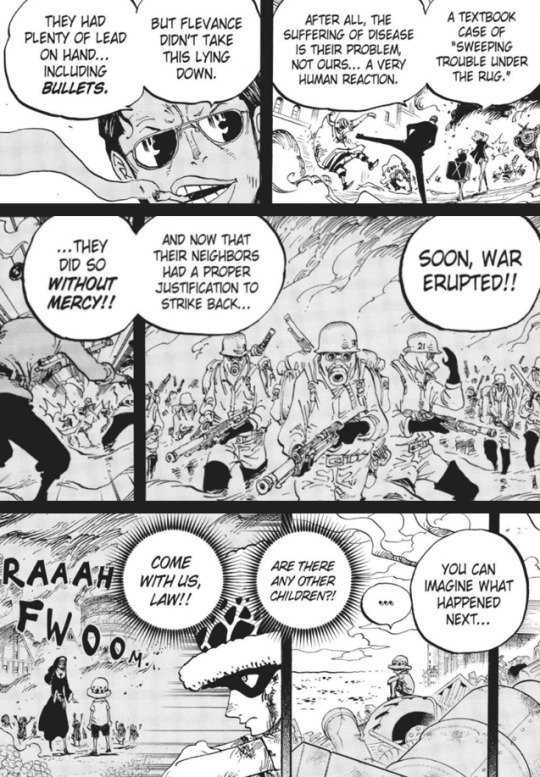
In the bible (especially in the old testament), God often inflicted these insanely disastrous events upon humanity, usually as some kind of punishment for their wrongdoings or as a test of their faith. Some events of which include (but are not limited to): famine, outbreaks of disease and natural disasters (e.g. hail, wildfire, earthquakes, floods). Historically, these stories played a key role in how humanity interpreted meaning from horrible disasters (e.g. assuming bubonic plague was sent as a punishment by god). Fire imagery is very common among these disasters as a representation for hell, which is clearly reflected in the destruction of Flevance.


Sometimes these disasters had sole survivors act as messengers for God. With that context, let’s put ourselves back in the shoes of a ten-year old Law. Raised religious, freshly traumatised from losing his home, his devout family, all the comforts of his life, and having the outside world completely abandon him, this kind of event is likely going to be processed as some form of divine punishment. Law stumbles through hell, finds all his dead classmates, and the last words of sister nun echo through to him here. Merciful and salvation are huge catholic buzzwords – promises of holy compassion, deliverance and hope – and all of it fire and smoke and riddled with bullet holes before him. A genocide funded, perpetuated and covered up by the same body Law was promised was there to save them. And the only reason Law hadn’t died with them was because he wanted to stay with his little sister Lami, who was on her deathbed, and his parents, who were themselves trying to help the afflicted citizens, Law’s own father (before he was shot and killed alongside his mother) begging for more doctors, fresh blood, anything the world can offer, and asking “Why doesn’t the government announce to everyone that white lead is not infectious?”
Oftentimes (and in the case of Law), when there’s a promise of heavenly intervention or some miracle that doesn’t follow through, it results in an ultimate feeling of betrayal and anger. Unfortunately a lot of Catholic teachings also use a lot of guilt, essentially teaching people that the bad things that happen to you are your fault and there needs to be some sort of penance (queue Law’s survivor’s guilt that carries on down the road). But also, if this was supposed to be some divine punishment, for what exactly? For the town being blinded by the incredible wealth they were sitting on? Being lied to? Continuing to extract their livelihood, ignorant of its dangers? Punishment for who? His parents? His innocent little sister? For ten year-old Law? These people who believed in God, who were good people? That’s fucking stupid. None of these people suffered and died for any reason at all — certainly not for a sacred one. God hadn’t saved a single one of them. Law had to crawl out of hell himself by sneaking over the border under a mound of corpses.
Given everything that happened here, Law has every reason to fall into nihilism, and you can see how his upbringing would’ve bred a lot of the feelings of guilt, anger and resentment that you still see in Law (which would suggest that though this is where he likely cuts ties with the religious/Catholic component of his faith, growing up with these teachings in his formative years would definitely influence underlying beliefs about how the world works, and how Law behaves and subconsciously processes information), but at the same time, there’s usually some form of redemption and changes to how these patterns of behaviour can be approached later down the line.
2. Corasan
Fresh off witnessing his whole world burning down around him, Law meets Corazon at the very bottom of this pit of self-destructive rage and unprocessed grief. Rosinante himself mentions to Sengoku that the hatred in Law at this time reminded him of his brother, but beyond the anger, harsh pessimism, vengefulness, I think you have to reach to find similarities between them. You can see some fragments of Doffy in Law down the line at times, with Law seeming to enjoy violence (especially against the navy, but given what they did to Flevance, it’s some well-deserved retribution for Law imo), but I’m not so sure it’s the cruelty so much as it is the high he gets off his own flavour of justice. Doctor’s Hippocratic oath maybe, but never once does Law like seeing others die (even at this point, he’s in tears next to a dead body, even though he’s the one holding the knife), and later on in Wano he makes it explicitly clear to Zoro that he’d rather see the mission fail than have any of them end up dead.
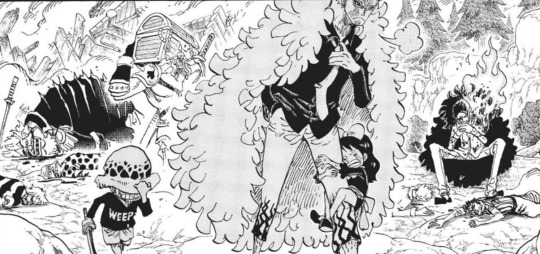
Little Law wanted to destroy the world and everything in it, but thinking rationally, what other choice did this kid have? He had no remaining family, was doomed to die before he hit puberty due to a terminal illness, was perceived as an infectious subhuman that most doctors would’ve sooner tried to exterminate than help. To Law, the world had turned its back on him – considering him a monster for simply surviving. He has all this hatred and pain boiling away with him with no tangible target to direct it towards. And this is the first clear cut rejection of faith that we see in Law. Any concept of a merciful God had just died. What God would allow this? Why is Law alive (a question that he repeats to himself throughout his life), why are these scumbags alive, why is the world going on spinning as if nothing has happened when his whole world had gone up in flames, why does anyone at all get to be here when everything I loved is gone? And it’s far easier to fall into a despondent nihilistic stupor than it is to work through any of that, and what’s the point in trying to process and move on from it, when there’s no hope for a future for Law anyway? When the only thing waiting ahead is more pain? What was this, if not a punishment? He’s supposed to be some messenger for God? How about fuck God, or whatever entity that exists that made him suffer this. Law’s not going to be a messenger for shit, thanks, he’d rather be their monster, he’d rather watch the world burn.
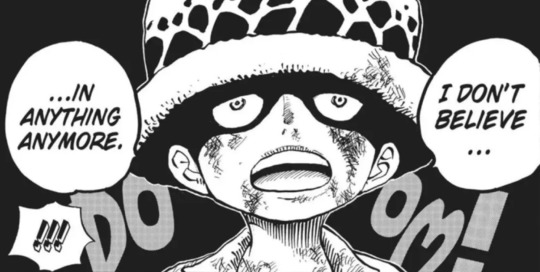
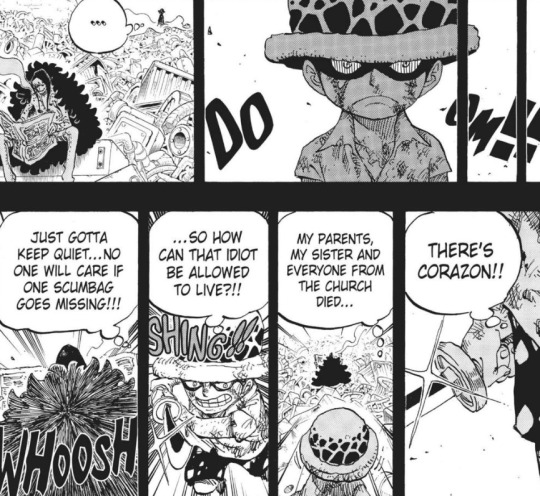
Corazon survives Law’s stabbing and doesn’t rat the little shit out (to Law’s confusion). It’s business as usual for another two years, then, one day Rosinante overhears his true name - Trafalgar “D” Water Law, and everything changes. On the back of his own beliefs, Rosinante dedicates himself to making sure Law a) lives and b) doesn’t become his brother. Law’s relatively short six month stint with Corasan forms the basis of Law’s new creed going forward, and all it took was a bit of kindness, love and humanity when the rest of the world had abandoned him. In the end Rosinante doesn’t save Law for the will of D. and the storm he’s predicted to bring in the future (as Law suspects), but he certainly believes in it, and the strength of Corasan’s conviction transfers right over to Law when he forces the ope ope fruit down the kid’s throat to heal him, tells Law he loves him, then sacrifices himself to set Law free.



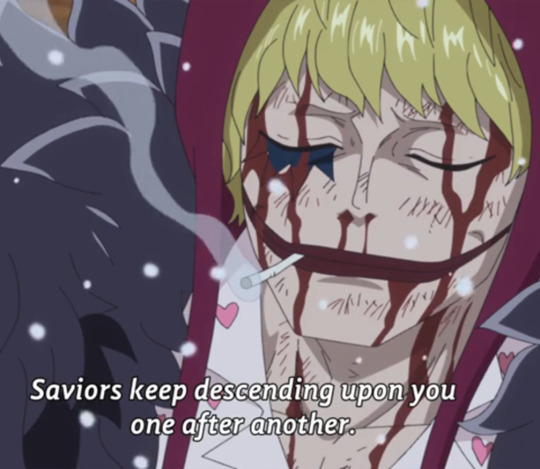
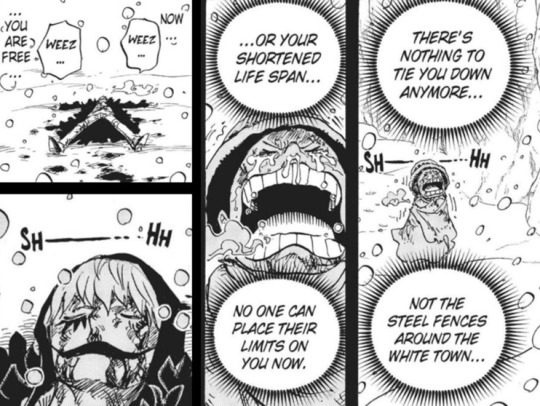
Law clings to that love he was given, he takes all these fundamental teachings and ways of thinking in regards to faith that were drilled into him during his youth, rejects the religion element and applies just about everything else to Corasan. He holds onto the last shreds of what Corasan leaves him with. Corasan becomes his “benefactor” (he gave my my heart), his saviour, his martyr.
And the crazy thing is, Rosinante was never really this saint Law makes him out to be. Law hated the clutz when they first met (mostly on account of Corazon throwing him through a glass window down at least two stories and into a pile of scrap). Corazon initially showed nothing but contempt for his presence (to ward him and the other children away from the Donquixote family, but these are still extreme measures). And it wasn’t until after learning Law’s name that Rosinante dragged him kicking, crying and screaming from hospital to burning hospital (not very saintlike in of itself), even after Law begged him to stop. Rosinante became Law’s saviour partly because of his belief in the will of D., and probably due to some guilt being a Donquixote, but mostly because he has always had a bleeding heart and he pitied (and had very quickly come to love) this angry, sick, deeply lost little kid. All this to say that Law’s faith in Corasan – this saintlike figure Law upholds him as in the future and the lengths he’s willing to go to avenge him/fulfil Rosinante’s purpose reflects the strength of the absolute beliefs Law would’ve been raised with in regards to God.
Whether it be out of survivor’s guilt (just one more body to heap on top of the Flevance pile), his love for Corasan, or for the sake of taking vengeance on the man that took away the one good thing he’d been able to regain in his miserable life, Law adopts Corasan’s will, the will of D. (which in of itself seems divine in nature), incorporates it into his new belief system, actively takes on the role of the divine punisher/justiciar and dedicates his life to bringing down Doflamingo.
3. Luffy
Catholicism dictates that the entirety of someone’s beliefs should be dedicated to one true cause (that cause being God) and expects people to ride on that, letting it carry them through life, give them hope, purpose, etc. But a lot of former Catholics choose instead to find that through something else. Corasan ignited the spark in Law’s faith around the will of D., but it’s not until he meets Luffy that this really becomes something that feels tangible and real for Law.
When Law saved Luffy in Marineford (putting the heart crew in danger for a stranger he met once), he said he did so “on a whim”, but that seems incredibly ooc for Law — this man that pretty much planned out how the rest of his life would go after the dust of Corasan’s death settled and he came to terms with the fact he wasn’t going to die at age thirteen like he’d originally thought. Circling back to the concept of Law being a sole survivor/messenger for God, it is interesting that Law is the one to seek out Luffy (given that Luffy is usually always the one either being abandoned by people or recruiting his crewmates), and Law is ultimately the catalyst for pulling him towards Dressrosa and Wano. There must be a REASON that led to Law deciding Luffy to be the most viable option out of the Worst Generation for an alliance (beyond blind trust in an unhinged captain that just so happens to also bear the initial D, and Luffy being one of the few captains crazy enough to go along with what Law was cooking up).
Law undoubtedly would’ve kept a peripheral eye on Luffy for some time before officially meeting him due to him being a rising competitor pirate and another “D” (I imagine the news of his utterly insane exploits would’ve made good reading material, too). The first time Law lays eyes on Luffy in Sabaody though, he still blows all expectations out of the water — crashing headfirst into the crowd of a slave auction and immediately committing a felony against a member of the most powerful upper one percent.
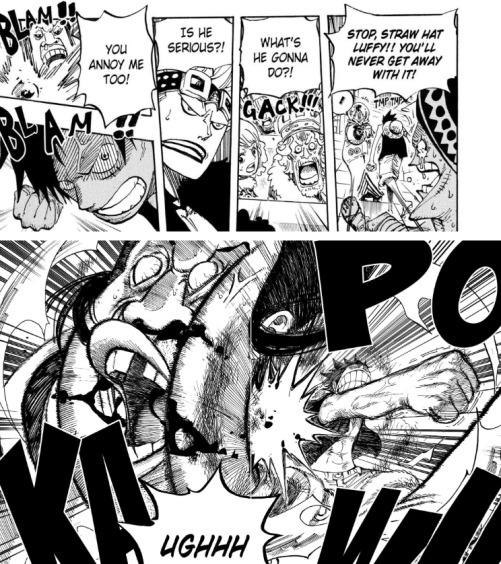

The world nobles are at an “untouchable God” tier in terms of class standing and believe it’s only natural for them to be entitled to whatever and whoever they want in this world that’s beneath them – the same kind of self-aggrandizing false divinity that Law has a a lot of repressed rage towards and that the will of D. is fated to oppose, so this, understandably, is a highly compelling first encounter, but it’s really only an initiating factor for what ultimately draws Law to Luffy. From their very first meeting (and probably before then, in the news stories and rumours Law likely picked up on), it’s made abundantly clear that Luffy does what he wants without a second’s hesitation, no matter the consequences, simply because he feels it is the right thing to do. Some call this an iron will, Law would be more inclined to call it willful stupidity and trouble, but time after time Luffy somehow manages to pull off what Law would best describe as “miracles”. And Law believes the straw hats just might be the ones to drum up another one for him.
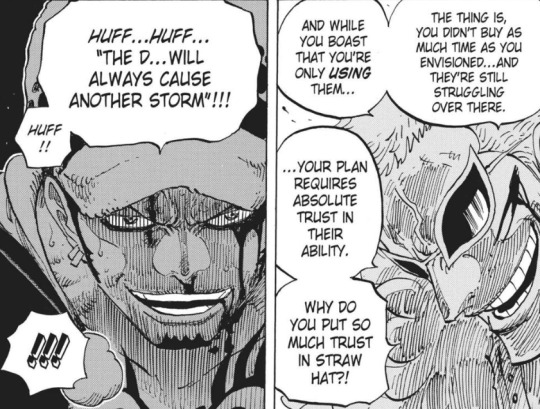
Luffy’s also got a lot of passing resemblances to Corasan going for him, e.g. inherently kind, compassionate liberators with big dumb hearts and wide goofy smiles in spite of everything they’ve been through, treating Law as nakama and saving his life despite his protests etc. All of which I’m sure Law hasn’t been completely unaffected by despite the high walls he puts up. And the more Law learned about Luffy the more it probably became clear that he is the antithesis to Doflamingo, i.e. what makes Luffy so goddamn dangerous and terrifying beyond his physical power is his ability to make friends with a simple kind of unconditional love that gets reciprocated enough so that these friends are willing to die for him.
Luffy agrees to the alliance, they successfully blow up Caesar’s base, and head off to Dressrosa. Now’s the time I should bring up that it’s taught in Catholicism that self sacrifice is the ultimate heavenly deed, and here Law is undoubtedly prepared to be a martyr for his cause. Law sends away his crew to Zou before Punk Hazard with the expectations that he’d never see them. He cultivates a fierce emotional detachment against Luffy’s willingness to bring him into the fold of the straw hats, and is resolute in that when the time comes, he will handle this himself, he will carry out Corasan’s will, and if he has to die for it, he will die with Corazon’s name plastered on his back. (Note here that Christianity is contradictory in that Law being this ready to die here is a sin, because revenge and suicide are highly discouraged, so you could say that by avenging and dying for his saviour, Law would be committing both the ultimate sacrifice and the ultimate sin).
Things get very dicey for Law in Dressrosa, to put it lightly. Doflamingo reveals that he was a celestial dragon (linking back into the will of D. “enemy of the Gods” notion), puts Law on the backfoot and gives him a thorough beating before shooting Law with a couple dozen white lead bullets in front of Luffy (because even when he’s winning Doffy loves to be a cunt about it). By the time Doflamingo is cuffing Law to the heart seat, it’s all looking pretty grim, and it’s very apparent when Luffy shows up to save him, that he is ready to die.

Law here has given up. He spent years planning his revenge for Corasan, but he lost, and he has very little left in the tank (physically, emotionally, spiritually). But Luffy doesn’t listen. Luffy who doesn’t think, doesn’t care, who trampled all over Law’s carefully laid out plan from the get-go and who is willing to take on Doflamingo single handedly for the simple slight that he dared to harm Luffy’s friend Law. Law will never find peace in his own demise because Luffy doesn’t do peaceful. He does loud and unashamed and open with no rhyme or reason other than the excruciatingly simply fact that he loves people and he thinks the people he loves deserve to have good lives. Luffy chucks Law over his shoulder and drags an injured Law across the city despite his protests (sound familiar?) and in the process inspires the fighting spirit in Law again.

When Law confronts Doflamingo again with Luffy in tow, Law’s faith in Luffy confounds him. The last Doflamingo remembers of Law is this beautifully moldable dark pit of grief and rage who’d given up on believing, period – who wanted the world destroyed. Not so long ago, Law had been a candidate for Doflamingo’s next protégé. Now?
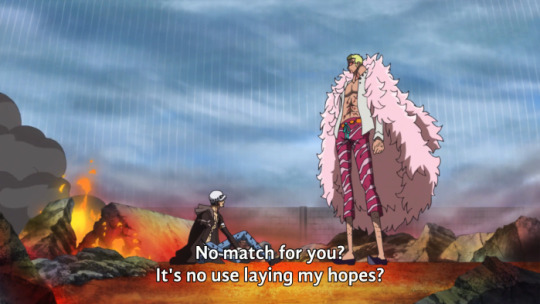


THIS is the action (grinning, staring down the barrel of a gun, flipping Doffy off as he tells him in not so many words that he may kill Law but he will never beat Luffy), Law’s unshakeable faith in the face of his own death is what has Doflamingo realising he will never regain control of Law again – is what incites Doflamingo to go from breaking Law down so he can build him back up again, to conceding defeat and outright killing him.
The trust that Luffy inspires in Law and the way he talks about Luffy (Luffy being this powerful, miracle-inducing liberator that Law can’t comprehend but follows anyway, Law laying down his hopes on him, weaponizing the will of D. to try and provoke fear from Doffy), is very reminiscent of the awe and faith talked about in scripture. Law discovers the feelings of comfort and hope that Catholicism was supposed to give him in Luffy, but Law’s belief in Luffy is a direct rejection of those teachings. Rejection by believing in a real life person as opposed to the divinity he was taught about. He’s also cementing his belief in the will of D., thus rejecting Doflamingo and all the people that embody the sort of “all powerful” divinity that he abhors (i.e. celestial dragons, Kaido, the Gorōsei/five elders) for the embodiment of hope and humanity.

When Law survives (again), he expresses he’d rather see Luffy beat Doflamingo with his own eyes or die with Luffy if he loses than leave. Then he watches, after all this talk of miracles, looking up in reverence as Luffy delivers, bright as the sun, haloed by the bars of a cage that’s haunted him for over a decade, Corasan’s words echoing at the back of his mind. God had never saved or freed Law, but Corasan was there for him, the heart crew was there, Luffy was there. And this is Law’s biggest, clearest rejection of religion – this newfound faith in humanity.
This faith in Luffy is put to the test again in Wano when Luffy is struck down by Kaido, but Law never truly stops believing that he’ll make a comeback. Even when the straw hats doubt whether he’s alive or not, something tells him Luffy’s not dead, and he holds onto that hope.
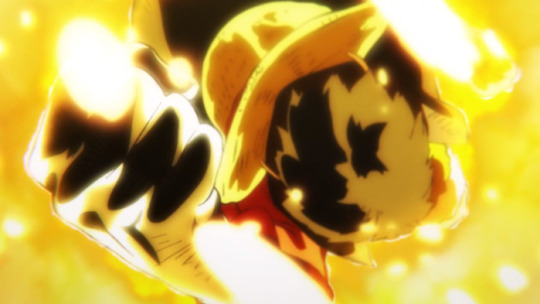







We also have the whole nika/joyboy backstory which really only reinforces all of this imagery/god-fearing looks of awe from Law and this idea of Luffy who is this perfect juxtaposition of empathetic and kind to incredibly fearsome fire and brimstone fighter. And regardless of whether you’re into the ship or not this is the impetus of Law’s relationship with Luffy for me, because here’s Luffy who has every right to have a chip on his shoulder and be downtrodden about all the injustices against him, here’s this little guy who against all odds, in the darkest of places, embodies light and hope and kindness and proves to Law that there will be hard times but there IS a happy ending at the end of the tunnel, despite it all. And everytime Luffy rises to the insurmountable challenge and wins, it just further cements that the will of D. is alive, that Corasan was right, that there's something redeemable in Law, a reason why he was worth saving, even if Law doesn’t understand it quite yet.
#merry christmas law religious trauma be upon ye#what’s an endearing idiot to a non-believer#long post#favourite character thesis statement. or something#ive been wanting to talk about this for a while but just been gathering my thoughts#will preface all this by saying I was not born or raised religious but the concept’s all very compelling from an outsider’s perspective#but I have had conversations about this to people like lesbianluffy who *were* raised catholic and relate to this experience#who I have to thank a lot for helping me wrap my head around this#this is a compilation of thoughts and conversations over the last two or so months#one piece#op#CJ's op watch-through#trafalgar law#monkey d. luffy#donquixote rosinante#donquixote corazon#monkey d luffy#lawlu#trafalgar d water law#gear 5 luffy#sun god nika#wano spoilers#lulaw#op meta#op analysis#one piece analysis
398 notes
·
View notes
Text
Banned Books Week 2024
Yes, it’s that time of year again, when we remember the books that have been banned throughout history. Is it just me that when I hear of a book banned or censored, I immediately go look into it? Kind of defeats the purpose of keeping it from the public. What am I going to focus on this year? The Holy Bible! Yes, that’s right, the Good Book itself has been banned. Let’s dive in and find out why!

Description:
The Bible is a collection of religious texts or scriptures, some, all, or a variant of which are held to be sacred in Christianity, Judaism, Samaritanism, Islam, the Baháʼí Faith, and other Abrahamic religions. The Bible is an anthology (a compilation of texts of a variety of forms) originally written in Hebrew,��Aramaic, and Koine Greek. The texts include instructions, stories, poetry, prophecies, and other genres. The collection of materials that are accepted as part of the Bible by a particular religious tradition or community is called a biblical canon. Believers in the Bible generally consider it to be a product of divine inspiration, but the way they understand what that means and interpret the text varies.
Author:
Well, if you’re an evangelical Christian, such as myself, you believe it was divinely inspired/written by God. It’s His #1 Best Seller. However, the accepted answer is that it was written by numerous authors over thousands of years. Well, whoever authored it, you have to admit, there are countless passages, pieces of poetry, and teachings that are breath-takingly beautiful. The Bible has left a cultural impact on the world.

Why It was Banned:
The reasons it is banned are incredibly complicated and on-going, but I’ll try to briefly answer it. From the start, the Bible has been challenged. The Roman Empire despised the Jewish people, who faithfully adhered to the Torah and went as far to destroy their culture, The Temple, Scriptures…And eventually the Roman Empire despised the Christians who adhered to both the Torah and the teachings of Christ. As the disciples and followers penned the books of the New Testament, they experienced persecution, which included opposition to what they believed and wrote. As time went on, sixty-six books (we know them as the Old and New Testaments) were compiled and generally accepted as what know as the Holy Bible. Eventually, the Roman Catholic Church came to power and more or less kept the Bible out of the hands of the people, to maintain control of the populace. Ironically, when the Protestant Church came into being, they accepted only certain books of the Bible, and wanted to purge it of less desirable ones. Martin Luther, I’m looking at you for your hatred of The Book of Esther. Various Islamic and Communist countries have banned or censored the Bible. The Puritans only accepted the Geneva Bible, rejecting the King James Version as corrupted by the Catholic Church. In the early 19th century, the good ol’ US of A fashioned a Bible especially for slaves, to encourage them to remain in bondage and not rebel or escape. In Nazi Germany, the Bible was rewritten, to strip it of its Jewish identity and Jesus was turned into an Aryan god. In 2008 or 2009, conservatives considered editing the Bible to remove certain teachings of Jesus because those teachings promoted socialism. As of late, the Bible has been removed from school libraries on the pretense that if you remove other books like “The Diary of Anne Frank,” “The Handmaid’s Tale,” or “To Kill A Mockingbird,” for being too graphic, controversial, or filled with offensive passages, you have to remove the Bible too.

My Thoughts:
I love the Bible; I’ve read it since I was a kid and for me, it inspires me every day. I turn to it for faith, guidance, hope, and to remind myself of Christ’s love. As a Christian, I obviously don’t want it to be banned. As a bibliophile, I’m against banning books. But I do think there is logic in the argument, that if you want to purge school and public libraries of books with “questionable content”, you’d have to remove the Bible too. Because the Bible does depict violence, sex, rape and incest, cannibalism, murder, prejudice, persecution, the questioning of authorities/governments…We can’t use the argument that the Bible could never be banned or censored in America, because that’s happened before. If we’re not careful, it could happen again. I feel the best remedy would be to cease book banning and censorship altogether and let the people decide for themselves how to think, believe, and what they want to read.
If you’d like to read the Bible, you can head over to Amazon.com and buy a copy. Or you can read it for free at BibleGateway.com
What banned book have you read this year?
#banned books#banned books week#banned books week 2024#the bible#the holy bible#christianity#tw: religion
3 notes
·
View notes
Text
Literary Canon (from kissgrammar)
The Holy Bible, Authorized King James Version [At a minimum, the books of Genesis, Exodus, Job, Psalms, from the Old Testament; Matthew, Mark, Luke, John, and Apocalypse from the New.] Whether or not you are Christian is irrelevant. The civilization in which we live is based on and permeated by the ideas and values expressed in this book. Understanding our civilization, the world in which we live, is probably impossible without having read -- and thought about -- at least the most famous books in the Bible. Historically, the King James Version is considered the most artistic, and thus has probably had the most literary influence.
Homer, The Iliad
Homer, The Odyssey
Sophocles, Oedipus the King (Oedipus Rex)
Sophocles, Antigone
Plato, The Republic, especially "The Myth of the Cave"
Ovid, Metamorphoses
Saint Augustine, The Confessions
Dante, The Divine Comedy
Giovanni Boccaccio, The Decameron
Niccolo Machiavelli, The Prince
Giambattista Vico, Principles of a New Science
Miguel de Cervantes, Don Quixote
Geoffrey Chaucer, The Canterbury Tales
Romeo and Juliet
King Lear
Hamlet
Othello
Macbeth
John Donne, "Holy Sonnet XIV"
John Donne, "A Valediction Forbidding Mourning"
Andrew Marvell, "To His Coy Mistress"
John Milton, Paradise Lost
Jonathan Swift, Gulliver's Travels
A Modest Proposal
Daniel Defoe, Robinson Crusoe
Laurence Sterne, The Life and Opinions of Tristram Shandy, Gentleman
Michel de Montaigne, Essays, especially "Of Experience"
Francois Rabelais, Gargantua and Pantagruel
Moliere, The Misanthrope
Blaise Pascal, Pensees
Jean-Jacques Rousseau, Emile
Voltaire, Candide
Erasmus, In Praise of Folly
Johann Wolfgang von Goethe, Faust, Parts One & Two
Honore de Balzac, Old Goriot (also translated as Pere Goriot)
Stendhal, The Red and the Black
Gustave Flaubert, Madame Bovary
Emile Zola, Germinal
Henrik Ibsen, A Doll's House
William Blake
William Wordsworth
Jane Austen, Pride and Prejudice
Lord Byron, Don Juan
John Keats, "Ode on a Grecian Urn"
Robert Browning, "My Last Duchess"
Charles Dickens - Oliver Twist
A Tale Of Two Cities
Hard Times
A Christmas Carol
Matthew Arnold, "Dover Beach"
John Stuart Mill, On Liberty
Lewis Carroll, Alice in Wonderland
Charlotte Bronte, Jane Eyre
Emily Bronte, Wuthering Heights
Francis Thompson, "The Hound of Heaven"
Samuel Butler, Erewhon
Oscar Wilde, The Picture of Dorian Gray
George Eliot- Silas Marner
Middlemarch
Robert Louis Stevenson, Dr. Jekyll and Mr. Hyde
Friedrich Nietzsche - Beyond Good and Evil
The Will To Power
The Birth of Tragedy
On the Genealogy of Morals
Alexander Pushkin - Eugene Onegin
The Bronze Horseman
Nikolai Gogol -The Overcoat
Dead Souls
Mikhail Lermontov, A Hero of Our Time
Ivan Turgenev, Fathers and Sons
Fyodor Dostoevsky -Notes From the Underground
Crime and Punishment
Leo Tolstoy -The Death of Ivan Ilych
War and Peace
Anton Chekhov, The Cherry Orchard
James Fenimore Cooper, The Deerslayer
Ralph Waldo Emerson, Essays
Emily Dickinson - "Because I Could Not Stop For Death"
"The Tint I Cannot Take"
"There's a Certain Slant of Light"
Walt Whitman - "Song of Myself"
"The Sleepers"
"Crossing Brooklyn Ferry"
"As I Ebbed With The Ocean of Life"
"Out of the Cradle Endlessly Rocking"
"When Lilacs Last in the Dooryard Bloomd"
Nathaniel Hawthorne - Young Goodman Brown
The Scarlet Letter
Herman Melville, Moby-Dick
Edgar Allen Poe - "The Raven"
The Cask of Amontillado
Henry David Thoreau, Walden
Kate Chopin -The Story of An Hour
The Awakening
Stephen Crane, The Red Badge of Courage
Henry James
Mark Twain, The Adventures of Huckleberry Finn
Luigi Pirandello
7 notes
·
View notes
Text
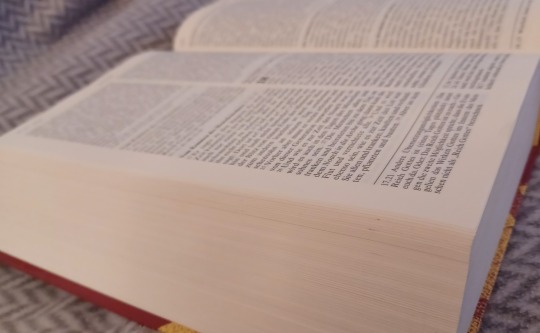
Little reminder, also in view of the upcoming Easter celebrations, for all those who like to write/wrote Bible fan fiction of the 'Jesus in the Gaza Strip 2023/2024' (1) variety. Or try to back up their anti-Semitic pro Palestinian arguments with biblical facts. :
THE BIBLE IS NOT GRIMM'S DAMN COLLECTION OF FAIRY TALES!
I know many of you think that, but the Bible is not the same or ever comparable in its nature and meaning to the Grimm's collection of fairy tales!
The Grimm's collection of fairy tales contains different, self-contained stories, many of which originate from the French and some of which have been passed down orally. The Brothers Grimm are not their authors! They merely collected them and polished them up for German domestic use, i.e. no foreign words and less sex and violence, but more Christianity and anti-Semitism. Each fairy tale stands on its own and has its own message and meaning. To understand the events in “Aschenputtel”, you don't need to know “Der treue Johannes” or “Das Mädchen ohne Hände”. Although the motif of the “wicked stepmother” plays a significant role, it speaks for itself and does not require an understanding of the fact that it also appears in the fairy tale “Die wahre Braut”. The story of the poor girl who has to endure many trials only to be rewarded for her steadfastness and kindness of heart by marrying the prince also loses none of its meaning. If, as in the French version “Cendrillon ou La petite pantoufle de verre”, the doves and the hazel branch are omitted.
The Bible, on the other hand, is a religious text whose purpose is to convey and pass on a doctrine of faith. It does not serve as entertainment literature for adults so that they can pass the boredom in the late evening hours. It consists of various religious scriptures. The various books and writings were created over thousand of years and were written in different languages — Hebrew, Aramaic and ancient Greek. The oldest books of the Bible originate from the Holy Scriptures of the Jews, including the Torah, while the most recent books were penned by members of the early Christian church.
The Bible is made up of two parts — the Old Testament and the New Testament. The Old Testament bears witness to the Old Covenant between God and the Israelites, while the New Testament bears witness to the New Covenant between God, the Jews, and the Gentiles.
The core of the Christian faith is the belief that Jesus' death and resurrection created a new covenant between God and mankind, replacing the old covenant between God and the Israelites.
Jesus Christ is the saviour and bringer of salvation promised to the Israelites by God. He came from and appeared to the Israelite Jews, who, as God's chosen people, naturally had the privilege of hearing his message first. It was only after his ministry, death, and resurrection that God also turned to the Gentiles and offered them the new covenant.
In the years that followed, the early Christian church increasingly separated itself from Judaism by placing the message of the Christian resurrection at the centre of their faith. The Jews, who did not confess Jesus as their Messiah, continued to hold on to the old covenant. (2) The Acts of the Apostles, which describes the process of separation, ends with the Church and Judaism facing each other as two different entities. Long story short — the faith message of the New Testament does not work without that of the Old Testament. Both are interrelated, refer to each other and are mutually dependent. It is not possible to take one part of the Bible without recognising the other. Because one cannot exist without the other!
And for all those who are not mentally capable of understanding the above explanations, here is a quick run-through:
→ Without the Old Covenant between God and Israel, no Messiah and Redeemer promised to the Israelites.
→ Without the Messiah and Saviour promised to the Israelites, no need for Jesus' mission as Messiah for the people.
→ Without the necessity of Jesus' mission as Messiah to the people, no birth of Jesus as Son of Man (in Bethlehem).
→ Without the birth of Jesus as the Son of Man (in Bethlehem), no ministry of Jesus, death and resurrection.
→ Without the ministry, death, and resurrection of Jesus, no emergence of a new covenant between God, Jews, and Gentiles.
→ Without the emergence of a new covenant between God, Jews and Gentiles, no emergence of the early Christian church.
→ Without the emergence of the early Christian church, no (religious) biblical testimonies (3) about the life and work of Jesus as the Messiah promised to the Israelites, who replaced the old covenant between God and Israel.
→ Without the Old Covenant between God and Israel, no Messiah and Saviour promised to the Israelites.
→ Without the Messiah and Saviour promised to the Israelites, no …
You see, the snake is biting its own tail. And anyone who still hasn't realised it by now has either voluntarily surrendered their brain and left themselves to the incompetent thinking of others. Or they are deliberately ignorant, hoping that if they just shout their lies loud enough, the truth will change. (Spoiler, it doesn't.)
What does that mean in concrete terms?
Well, I'll explain it to you using the example of anti-Semitic propaganda from the year 2023, in December, especially around the Christmas holidays (24/25 and 26 December):
“Jesus, who is suddenly of any descent, just not Jewish, would have been bombed to death if he had been born in Bethlehem in 2023, because all Jews are evil and something to do with genocide.”
(All statements summarised and “slightly” paraphrased, of course.)
Apart from all the nonsensical morally degenerate genocidal ramblings, this kind of “reasoning” is nothing but pure hypocrisy and double standards and disqualifies you from any factual argumentation from the outset. You cannot cite a biblical fact to lend legitimacy to your despicable human argumentation just because it benefits your self-imposed mission, since Bethlehem is on Palestinian territory. While at the same time denying the identity of the man without whom the source from which you cite this fact would not exist!
The only source that cites the fact “Jesus was born in Bethlehem” is the New Testament of the Bible itself. There is not a single proven and verified historically correct independent third source that confirms this fact! Historians and biblical scholars assume that the historical Jesus was probably born in Nazareth, and the evangelists added Bethlehem in reference to the birthplace of King David in order to substantiate Jesus' descent from Abraham and King David.
And for all those who are confused again:
You cannot cite the biblical fact of Bethlehem as Jesus' birthplace to fuel your point of view of your genocidal fantasies, but at the same time ignorantly deny all self and other statements about Jesus'! Be it his self-definition and understanding or his social recognition as an Israelite Jew who actively practised the Jewish faith in the four gospels, by declaring that he was anything but that!
Therefore, as long as you do not recognise the biblical Jesus' as an Israelite Jew, hands off any biblical evidence! Otherwise, you will expose yourselves in the simplest possible way as what you are, hypocrites and double-moralists!
(And before we misunderstand each other here, unbelieving Thomas' who can not see the miracle of Jesus' resurrection are not my problem. Only people who have the understanding of morality, empathy, and sense of justice of a rotting corpse and feel the urgent need to justify their lies, distortions of facts and hypocrisies with biblical arguments. Or anti-Semites for short).
(1) Of course, this also applies to the coming years 2025, 2026, 2027 and beyond.
(2) Expressed in a very simplified way so that this text, which is already very long, doesn't explode even more.
(3) (New Testament + addition to the Jewish holy scriptures (Old Testament) = Bible)
Edit: How angry was I when I wrote that? Very! Could I put it more diplomatically? Yes. Is that what I want? No, just come to terms with the fact that I have no patience (any more) for people with the morals of a rotting corpse.
Source:
The mentioned Bible passages:
Now after Jesus was born in Bethlehem of Judea in the days of Herod the king, […]
(Matthäus 2,1)
And Joseph also went up from Galilee, from the town of Nazareth, to Judea, to the city of David, which is called Bethlehem, because he was of the house and lineage of David, to be registered with Mary, his betrothed, who was with child.
(Lukas 2,4-5)
Now Thomas, one of the twelve, called the Twin, was not with them when Jesus came. So the other disciples told him, “We have seen the Lord.” But he said to them,“ Unless I see in his hands the mark of the nails, and place my finger into the mark of the nails, and place my hand into his side, I will never believe.”
(Johannes, 20,24-25)
If you want to look up these Bible passages but don't have the English Standard Version (ESV) or a similar edition to hand, you can find the online edition here: https://www.esv.org/
As a source for the explanations and descriptions of the composition of the Bible (Old and New Testament) as well as the distinction between Jewish and Christian beliefs, I refer without further ado to my Bible lit. As a German Roman Catholic, I use the German-language “Einheitsübersetzung”, which is supplemented with biblical, historical and theological notes and has already been used in my religious education lessons, first communion preparation and confirmation preparation, among other things.
(If anyone would like to have the individual proof of this, please contact me. I will do my best to scan and translate the relevant passages. Otherwise, the search engine of your choice is still your best friend.)
The biblical explanation about Bethlehem can be found here: https://www.bibelwissenschaft.de/ressourcen/wibilex/altes-testament/bethlehem And the information about Grimm's Fairy Tales here: https://www.maerchenatlas.de/category/deutsche-maerchen/grimms-marchen/
(The two links are only in German, however, as I don't feel like looking for an English-language source at the moment. It's late and I have to get up early tomorrow morning. Either use the translation tool you trust (I like to recommend DeepL, because of its accuracy) or simply search yourself for “Bethlehem Jesus Birthplace”, "Grimm's Fairy Tales" or similar word combinations.
If you don't want to believe my "slightly" paraphrased example of anti-Semitic propaganda, just enter "Christmas 2023 Gaza" in the Tumblr search bar and you'll find plenty of material.
#Antisemitism#israel#pro israel#gaza#Bible#Bibleknowledge#Bible fanfiction of the 'Jesus in Gaza 2023/2024' kind#The Bible is not Grimm's collection of fairy tales#Jesus was an Israelite Jew#Hypocrites and double standards#People who have the moral understanding a rotting corpse#Very long post#rant
3 notes
·
View notes
Link
0 notes
Text

Dayspring. By Anthony Oliveira. Strange Light, 2024.
Rating: 4/5 stars
Genre: literary fiction, lgbtqia+
Series: N/A
Summary: A singular, stunning debut that transcends and transfigures genre—at once a bold retelling of biblical tales and an unforgettable contemporary coming-of-age story, connected in collapsing time across millennia.
There are few love stories in the holy books. Love is what ruins. Love is what costs. Love is a flaming sword at our backs, a garden left to ruin and to wild.
In Dayspring , Anthony Oliveira brings to vibrant, glorious life the gospel according to the disciple Christ loved—his companion in the days before the crucifixion, the only instrument that remembers with fidelity his sound.
Sacred, profane, and rich with explicit desire and a poetic attention to form, Dayspring weaves electric and heart-wrenching stories of passion, grief, destruction, and survival into a narrative unmoored in space and time, one that re-examines and re-frames great and doomed figures from scripture and history, even as it casts its keen eye on the trials of modern life.
***Full review below.***
CONTENT WARNINGS: sexual content, blood, gore, brief references to suicide
TL;DR: Dayspring is a gorgeous lyrical book that reinterpets Biblical stories through a queer lens, focusing particularly on Christ and his most beloved disciple. More poetry than narrative, this book is memorable for its imagery and intertextuality, and it's sure to move readers with an interest in poetry and queer Christian spirituality.
I'm not quite sure how to structure this review because Dayspring isn't exactly a novel. It's more like a miscellany of poetry, vignettes, excerpts, and maxims, bound together by a loose narrative that is "told" primarily by (presumably) John, disciple of Jesus. In this, Dayspring is a queer reimagining and reinterpretation of the Bible, blending Old and New Testaments as well as ancient, medieval, Renaissance, and modern poetic imagery.
I really loved the intertextuality of this book. Oliveira is not only thoroughly knowledgeable about the Bible, but also shows his love for medieval mystics, Renaissance writers, and modern language. As someone who is also familiar with a lot of these texts, it was delightful to see how Oliveira referenced and reworked some fairly famous phrases, or else how he placed entire excerpts within his book to encourage a reading that may not be obvious.
I also enjoyed a lot of the imagery in this book. Because it's largely lyrical and poetic, there are some stunning passages that juxtapose sacred and profane, the bodily with the spiritual, and so on. All this cultivates a feeling of deep, personal love between the main speaker (John?) and Christ, and I loved that their relationship was rooted in physical sensation, spiritual rapture, and angst over Christ's divinity. I also think a lot of this book humanizes Christ in a way that makes him feel approachable, and I much prefer a down-to-earth Christ with the weight of expectation to the confident, godly Christ that always talks so solemnly.
All that being said, I do have a bias against modern poetry, which is the cause of my 4 star rating. It's not that Oliveira did anything wrong; I respect the work and experimentation that went into crafting this book. I just personally have a hard time with free verse, as I think the unstructured format tends to get away from authors a bit. But this is entirely subjective; if you enjoy modern poetry, you'll probably have a wonderful time with this book.
0 notes
Text
Christianity and Ghosts
Christianity views ghosts through a lens that combines theological interpretation with skepticism. Though the conventional Christian perspective tends to focus more on the reality of angels and demons than on human spirits surviving on Earth, the Bible does contain references to spirits and the supernatural. The concept of ghosts—or spirits of the dead interacting with the living—is not fundamental to the beliefs of a large number of Christians. Some interpret a few stories in the Old Testament as ghost experiences. The story of the Witch of Endor in 1 Samuel 28 is among the most famous, in which King Saul uses a medium to call upon the spirit of the prophet Samuel. Theological scholars often dispute this tale; some view it as evidence of the resurrection of the dead, while others perceive it as a divinely orchestrated event or a manifestation of demonic deception.

The resurrection of Jesus and his post-death appearances to his followers are major themes in the New Testament. Despite their apparent resemblance to ghostly encounters, these appearances are essentially distinct in Christian theology. Christians understand the resurrection of Jesus as a physical, bodily resurrection, symbolizing their victory over death and the promise of eternal life, rather than a ghostly presence. In addition, unlike the idea of ghosts, the Holy Spirit—who is a member of the Holy Trinity—represents God's presence and activity in the world, making him a unique and crucial component of Christian religion. In general, Christian theory holds that after death, souls either go to heaven or hell; in Catholic theology, purgatory is a transitory place where individuals who are undergoing purification before joining heaven can go. This largely refutes the conventional view of ghosts as souls imprisoned on Earth. Sometimes, instead of referring to actual ghosts, people explain encounters with what appear to be ghosts in terms of demonic activity or psychological disorders.

Despite this, folklore and cultural beliefs about ghosts have influenced certain Christian groups. Local customs and beliefs regarding the afterlife coexist with Christian teachings in several communities. For instance, customs surrounding All Souls' Day and other holidays that entail remembering and honoring the deceased exist in several regions of Latin America and Europe; these customs occasionally collide with spectral mythology. Generally, mainstream theology is wary of the concept of ghosts, even though Christianity acknowledges the existence of spiritual entities and the potential for supernatural happenings. Rather than conversations with deceased people's spirits, the emphasis is still on the soul's eternal destiny and the significance of salvation via trust in Jesus Christ. Christian teachings outline the promises of the hereafter, inspiring Christians to focus on them and look beyond this life.
0 notes
Link
0 notes
Text

One of the most famous stories in the Holy Bible, David defeating Goliath is the ultimate underdog story. The story has become synonymous with a less favored opponent beating a favored one, heard in sports and politics, a David beating a Goliath. There is more to the story than it may initially appear. What is a giant opponent in your life? This story can mean so much more if we apply it to our daily lives. I would like to go over a few lessons for this classic Biblical tale.
First, there is the lesson to "not judge a book by its cover." David was the smallest of his brothers, and when he entered the battlefield in the valley of Elah, Goliath ridiculed him, Saul, and the Israelites for allowing such a small "boy" to fight against him. Before he shuts his mouth with a stone, David shuts his mouth with the Bible verse above. Contemplate a major life challenge that you are facing. Think of it as if it were a giant, your "Goliath." Now approach it the SAME way that David does. What does your challenge approach you with? Violence, debt, shame, embarrassment, pain, suffering...None of these can harm you! Although David was small in stature, he made up with in heart and faith, as he does throughout his story in the Old Testament. Goliath misjudged him, and our hurdles will also misjudge us if we maintain the same faith and hope that strengthened David on the battlefield that day.
The second lesson comes from 1 Samuel 16:7: "But the LORD said unto Samuel, Look not on his countenance, or on the height of his stature; because I have refused him: for the LORD seeth not as man seeth; for man looketh on the outward appearance, but the LORD looketh on the heart." I think David proved this Bible verse true during his battle with Goliath. Mocked for his stature, no matter the outcome of the battle, no man could mock him after watching the brave manner with which he fought. Think to your own life: Who do you most look up to? Are they wealthy, successful, beautiful people? I would say for most of us, the answer is "Yes" to these. Sometimes that means that they are wealthy, successful, and beautiful in God's eyes, but sometimes not. A pure heart allows God to accomplish any good work through anyone. Is your heart pure? If not, you must work to make it pure in the future.
Lastly, I want to talk about the importance of asking the LORD God Almighty for help. David has no fear in his battle with Goliath, but few people in the Holy Bible seek God's guidance, forgiveness, and counsel more than David. He has confidence that the LORD is always with him, because he is constantly communicating with the LORD. Do you? The lessons from this story can be used to meditate on any challenge that you may face, so that we may also defeat giants! A pure heart allows God to accomplish any good work through anyone. And, remember of asking Father God Almighty and the LORD Jesus Christ for help. Thank Father God Almighty and the LORD Jesus Christ for easing our burdens and granting us the rest found in His mercy and forgiveness. May He teach us to walk in His gentleness and grace. Thank Him for providing us the strength to serve Him and for carrying the weight that should have been ours, all in His gracious name. Thank Father God Almighty and the LORD Jesus Christ for faithfully staying with us in all times and places. We have not always sought Him and His guidance, yet He has continuously shown us the way back to Him. May He guide everything that we say and do, and show us the way no matter where He may lead us.
May He empower us by His Holy Word and Spirit to live in the light of His Truth, love grace. May our healing and transformation glorify His name and Kingdom of Heaven and reveal who He truly is to others. May He help us to keep close to Him, so that we may endure until He fully sets us free and brings us to our true home in His Kingdom of Heaven. Thank Him for His Holy Word and Spirit. Thank Him for revealing the Truth of Him and His holiness. May He help us to hold close to Him just as He holds close to us, so that we may live in humble and faithful obedience. If we stray from Him and His path, may He use His Holy Word and Spirit to bring us close to Him once again. May He help us daily to trust fully in Him and His love, provision and care. Thank Father God Almighty and the LORD Jesus Christ for making us anew! May He complete His renewing work in us, ridding us of the sinful words, thoughts and actions that aren’t from Him, so that we may reflect only His love and light and presence in us to this dark and fallen world and the lost souls within it.
God is our Heavenly Father, our Creator and our guide. And Jesus Christ is our LORD and Savior and King. As Christians, we trust Him wholeheartedly and we submit our heart and our lives into His skilled hands. May He shape us according to His design and plan for us, so that we may stand strong in the firing furnace and emerge revealing His craftsmanship as He prepares us serve Him on Earth and in His Kingdom of Heaven according to His Holy Word and will. May He give us the peace and endurance we need each day, and may He use this time to help us grow in His wisdom and strength and to grow in our walk and relationship with Him. May He make us more into the person that He not only created us to us to be, but called us to be from the very beginning.
Thank Father God Almighty and the LORD Jesus Christ for securing a place for all true Christian believers as followers of Christ and spiritually reborn children of God in His eternal Kingdom. Each day, the sun rises and its light and warmth, and the Holy Bible gives us a glimpse of the promised eternity to come. May we continue to walk in the love and light of Christ with our heads held high and our eyes on the finish line. May we lead others to His Gospel Truth and to His light as well throughout this journey with Him. Let us all humble ourselves before God daily, asking Him to forgive us and to strength and teach us to view life through the lens of God and His promises. May He guard our hearts against Satan and the temptations of this world and our flesh. May He give us the peace to find full satisfaction in God and His peace and promises, so that we may live our lives daily in ways that honor and pleases Him. As we seek Him daily, may He reveal Himself to us through the words He has provided and use it to conform the desires of our heart to Him and His love and compassion and grace.
As true and spiritually reborn Christians, we love, trust and believe in Father God Almighty and the LORD Jesus Christ. We choose to keep Father God Almighty and the LORD Jesus Christ first in our hearts and lives and all other worldly desires behind us. He extends salvation to everyone, and we want to show the world the freedom, hope and peace they can have in accepting and following Him. We must ask Him to help us grow spiritually in our relationship with Him and strengthen us and the bonds of love that He has given us, so that our unity may glorify and testify to His power and goodness. Thank Him for calling us to faith and imparting us with salvation and righteousness. May He empower us to live in His will and righteousness, so that we may testify to His soul-saving power as our faith carries us past all doubt, fear, and failure. May He grant us the grace to forgive others who have wronged us, and the humility to seek forgiveness where we have caused strife. May we follow and serve God daily with love, trust, awe and wonder. May Father God Almighty and the LORD Jesus Christ strengthen our faith, lift our spirits, protect our hearts, and show us opportunities to help bring others to Him and His Gospel Truth daily. May we do this duty boldly, humbly and faithfully. Seek, follow and trust in the LORD God Almighty always! To God be all the honor and praise and glory!
We must come to Father God Almighty and the LORD Jesus Christ with sincere hearts to ask forgiveness and follow Him and His Holy Word and Spirit always. We praise Father God Almighty and the LORD Jesus Christ for the mercy He bestows upon us and we are grateful for His grace and mercy and infinite blessings. By surrendering our hearts and our lives to His will, we see all the blessings He has bestowed upon us. God our refuge and our salvation and our constant provider. We lift our voices to Him in praise for His steadfast love, mercy and understanding. May Father God Almighty and the LORD Jesus Christ open our minds and hearts more and more to perceive and embrace Him and His truths. May He help us to find time to pray and read and study the Holy Bible daily and to find power in prayer, praying according to His Holy Word and will. May He help us to come to Him in true repentance and with faith in Him and His grace and merciful nature. May He give us the grace, courage and strength we need to walk with Him and do His will daily. May He teach us to watch our words when we pray to Him and to speak reverently and rightly. May we continually ask God to transform our hearts and make us faithful and humble as we walk with Him daily. We must come to Father God Almighty and the LORD Jesus Christ with honest, humble and repentant hearts. We must seek Him and His will and choose to follow Him all the days of our lives. May He help transform our hearts, help us to seek and live for Him above all else and to grow spiritually and build our faith and relationship with Him with each passing day. May He forgive our sinful nature and help us always make Him and our relationship with Him top priority.
As true and born-again Christians, we choose to walk in His righteous path and lead a life that is pleasing to Him. We desire Him and His will above anything else. We desire to walk in accordance with the love and light He has shown to us through His Holy Word and Spirit. We long for a deeper relationship with Him and a deeper fellowship with our brothers and sisters in Christ as well. When we fall into temptation and sin, we must turn to Him for forgiveness, strength and guidance. When believers learn to walk in accordance with God's Holy Word and Spirit, they have deeper fellowship with both God and one another. And the sin that could threaten to destroy that fellowship, if confessed (1 John 1:9), is covered in the blood of Jesus Christ and no longer a barrier between us and God. May we ask Father God Almighty and the LORD Jesus Christ to forgive us for any sins we have sinned this day or in days past. May we be faithful to Him and His Holy Word always. May He help us to walk more consistently in the light and to not neglect long to confess and forsake any sins that hinder our walk with Him. May He lead us in the direction He wants us to go so that we may seek and serve Him faithfully. God is holy and almighty and deserving of all praise honor and glory. We rejoice in Father God Almighty and the LORD Jesus Christ, knowing He is the same yesterday, today, and forever (Hebrews 13:8). He is the Alpha and the Omega (Revelation 1:8). May our hearts always be filled with thanksgiving and rejoicing. May He help us to praise Him freely and honestly like all believers who came before us. May we live a life that showcases our love and trust in Him and His Holy Word and Spirit as He uses us draw others to Him and His soul-saving Gospel Truth daily. May He continue guide, correct and protect us, so that we continue to grow in Him and not weaken and stray. May we all remain faithful to Him and to this duty and purpose He has called us to. Seek and put your faith and trust in Father God Almighty and the LORD Jesus Christ and let Him do the rest. May He humble our hearts and help us focus on following and serving Him daily and helping others with joy and happiness. We lift our voices in praise to Him for His love, mercy, peace, faithfulness and grace - For EVERYTHING!
It is vital that we remain rooted in Father God Almighty and the LORD Jesus Christ through prayer and His Holy Word and Spirit and that we live and walk as a beacon of His light and love and share and spread the Gospel Truth daily, so that the lost souls in this world can come to know Him and be saved. The more we focus on Father God Almighty and the LORD Jesus Christ, growing spiritually by building our relationship with Him, leaning on Him and His Holy Word and Spirit, the better off we will be. Thanks to this and our faith in Him, we know that everything will be alright. And we will forever be grateful to Him. As true and born-again Christians, we believe in Him and His Holy Word and we strive daily to walk in His Holy Spirit. We know though our mortal bodies should die, He will raise us up and into new and glorious bodies (The Rapture). We who are truly His and alive at His second coming will never die, and our bodies will be changed in a moment, in the twinkling of an eye, and so shall we ever be with Him in His Kingdom of Heaven forevermore (1 Corinthians 15:51-52, 1 Thessalonians 4:16-17). This is one of many promises given to us by God Himself. Thank God for His strength and guidance when we are faced with sin and temptation. Thank Him for His mercy and grace. Through Bible study and prayer, God reveals His wisdom and guides us to see opportunities to grow closer to Him and grow spiritually. He gives us direction to live our lives daily according to His will.
Jesus Christ is the ONLY way to Heaven (John 3:5, 14:6), the ONLY way to salvation (Acts 4:12, Ephesians 2:8-9) and He is the resurrection and the life (John 11:25-26). Jesus Christ the LORD of lords, the KING of kings, the GOD of gods (Deuteronomy 10:17, 1 Timothy 6:15, Revelation 17:14, Revelation 19:16) - He is the Living, Almighty and Everlasting God (Isaiah 9:6, Revelation 1:8, John 3:16, John 3:36, Jeremiah 10:10). There is no other God besides Him (Isaiah 45:5). We MUST humble ourselves before Him, turning our backs on false teachers, false gods and idols and our sinful ways. We MUST repent and turn back to God and recognize who He is and love Him in return for His great love for us. We MUST make God top priority everyday! May we be motivated to spread God's Holy Word and Gospel Truth to all the Earth, knowing that it is the only hope of all those lost in their sins. Let us not hold out a false hope for men to be saved without the Gospel, but instead, strive to do our part to get the Gospel out to a lost and dying world.
Leaning on Father God Almighty and the LORD Jesus Christ through prayer and His Holy Word and Spirit strengthens us and our knowledge and wisdom about God and His Gospel Truth, exposing these imposters. May God help us to seek and lean on Him daily to gain the strength, wisdom and spiritual discernment needed to expose Satan and his imposters who seek to destroy us and God's ultimate Truth. Everyday, we must remember to share Jesus Christ's Gospel Truth with the world and to thank Father God Almighty and the LORD Jesus Christ for the grace that He poured out for us on the cross at Calvary. He has freed us from the burdens of sin and from the eternal damnation of Hell. In all we say and do, may all praise, honor and glory always be given to Him and His Kingdom of Heaven.
With renewed minds, hearts and wills, let us serve Him humbly and faithfully out of pure love and grateful rejoicing. May He remind us of His presence and to remain at peace, fully knowing that all will be well because He is always with us. Let us seek Father God Almighty and the LORD Jesus Christ today and everyday with all our heart and being, looking for His love, light and will for our lives with each step we take. Let us seek to please Him with our thoughts, words, and deeds and seek to advance His Kingdom of Heaven and His glory with our lives. Let us seek Him from a pure and humble heart, and when we so seek, we believe Him and His promise that we will find. May He help us all to be more sensitive to the teaching ministry of His Holy Word and Spirit, relying on Him and allowing Him to speak to us and guide us every step of our Christian journey.
God gave us the Holy Bible - His living and Holy Word - to let us know of Him and His abiding love and care as well as guide and prepare us for all our lives. May He help us encourage one another as we continue our walk with Him and our duty to Him daily. Thank Father God Almighty and the LORD Jesus Christ for being present for all our new beginnings and all our lives. May He redirect any anxiety we feel as He provides countless opportunities for growth and change. May we humble ourselves before God always, asking Him to forgive our sins and make our hearts and lives anew through His Holy Word and Spirit. May He help us make Him and His Holy Word top priority, so we can grow spiritually and grow in our relationship with Him as we apply it to our daily lives. Thank God that we can focus on Him and everything about Him, for that is what keeps us sane and at peace. May our words and actions always be a reflection of Him and His Holy Word and Spirit and will.
May He help us to always walk in His grace and Holy Spirit, not by our own measure. May He give us the humble humility to know that our freedom and eternal salvation is found only in Him, so that His grace may sustain us, and we may never lose sight of His love and light and mercy. Thank Father God Almighty and the LORD Jesus Christ for calling us to Him and to serve Him. May He equip us to do all that He has called us to do so that as He works through us, He may use us to produce fruit, to reach others, and to encourage all brothers and sisters in Christ. May He work all of these things in us and through us for His Kingdom and His glory. Thank Father God Almighty and the LORD Jesus Christ for all His creation, for His miraculous ways and for everything He does and has done for us! Keep the faith and keep moving forward in your walk with Jesus! He loves us and He knows what is best for us. Seek, follow and trust in Him - Always!
Thank Father God Almighty and the LORD Jesus Christ for His Holy Word and for sending His Holy Spirit so that we might have His grace, not only to awaken us and transform our hearts in our spiritual rebirth and guarantee our eternity with Him, but to also call upon Him whenever we are in need. Thank Father God Almighty and the LORD Jesus Christ for all the reminders of His love and mercy and faithfulness within His Holy Word. He is bigger than any challenge or circumstance in our lives. Knowing this within our minds and our hearts, nothing can deter our faith in Him and His Truth. May we all accept Him and His eternal gift of salvation and ask that He would transform our hearts and lives according to His will and ways. Thank Father God Almighty and the LORD Jesus Christ for His Holy Spirit who saves, seals and leads us. May we always thank Father God Almighty and the LORD Jesus Christ for His almighty power and saving grace. For He is our strength, and He alone is able to save us, forgive our sins and gift us eternal salvation and entry into His Kingdom of Heaven.
May we make sure that we give our hearts and lives to God and take time to seek and praise Him and share His Truth with the world daily. May the LORD our God and Father in Heaven help us to stay diligent and obedient and help us to guard our hearts in Him and His Holy Word daily. May He help us to remain faithful and full of excitement to do our duty to Him and for His glorious return and our reunion in Heaven as well as all that awaits us there. May we never forget to thank the LORD our God and our Creator and Father in Heaven for all this and everything He does and has done for us! May we never forget who He is, nor forget who we are in Christ and that God is always with us! What a mighty God we serve! What a Savior this is! What a wonderful LORD, God, Savior and King we have in Jesus Christ! What a loving Father we have found in Almighty God! What a wonderful God we serve! His will be done!
Thanks and glory be to God! Blessed be the name of the LORD! Hallelujah and Amen!
1 note
·
View note
Note
Hi! Your posts have been so interesting to read through!! What was your inspiration for syncing the hellenic and hindu pantheons? And what has your thought process been as you've been writing your holy texts? Hope you're having a good day/night!
Thank you anon! I’m really glad you’re enjoying them 🥰
Why Kaênaastha?
I grew up in an area that had a very large Hindu and Sikh population, meanwhile I was raised Roman Catholic and was not allowed to participate with any of my Hindu/Sikh friends religious holidays or festivals. When I got into adulthood I began learning more about Hinduism (both from an academic and spiritual perspective) and began to incorporate aspects of Hinduism into my personal practice. Then, earlier this year, when I rejoined Tumblr I got really into Hellenic Polytheism/Hellenic Paganism. Both of these spiritual paths felt correct for me, but I personally found it really difficult to try to incorporate the two together in their whole forms. Additionally there were some aspects of these respective faiths that I didn't like or agree with. So I decided that instead of trying to fit myself into the frameworks of other traditions I would just make my own. (As a side note, I personally get frustrated when I find multiple sources for myth or practice that contradict - so it made my practice feel much easier to create my own religious/spiritual canon).
The Kitaab Pavos (Kaênaasthan Holy Texts)
In order to best answer this question I'm going to explain each of the 6 Kitaab Pavos.
1: Bhajan aur Gaani Gia O Devi [Hymns and Songs for the Gods]
The Bhajan aur Gaani exists as a central text that consolidates and houses any hymns, poems, songs, etc. written for or about the Devis.
2: Mithak Kahaanee Tou Devi [Myths and Tales of the Gods]
The Mithak Kahaanee is meant as a companion to The Shurūchí Samay. The Shurūchí Samay is the Kaênaasthan creation myth - whereas The Mithak Kahaanee is the collection of all other myths or stories about the gods that doesn't have to do with "The Creation".
In Kaênaastha all myths are viewed as symbolic - they aren't supposed to be read as literal truth, and instead as a cultural story that provides a backbone to certain moral and philosophical beliefs.
3: Raayaastha [The Opinions of the Faith]
The Raayaastha exists as a documentation of the morals, opinions, and thoughts of the Kaênaasthan faith and those who follow it. It expans upon the foundation laid by the Terah Alitheia and goes issue by issue throughout a variety of social, ecological, and political issues.
4: Shurūchí Samay aur Génnisi Devi [The Beginning of Time & The Birth of the Gods]
This is the Kaênaasthan creation myth, it "explains" how each of the Devis came to be.
The Shurūchí Samay is also meant to coexist with scientific data and the current understanding of how the universe, our solar system, and our planet came to be. While not meant to be taken literally (as stated above) part of the purpose of The Shurūchí Samay is for Kaênaastha to have a creation myth that doesn't contradict scientific theory and fact.
5: Terah Alítheia [The 13 Truths]
While not a direct allegory, The Terah Alítheia could be compared to the 10 Commandments found in the Old Testament of the Christian Bible. It exists as a foundational text that guides morality and Kaênaasthan belief.
While the title literally means "The 13 Truths" - it is more accurately described as "the 13 beliefs/moral guidelines".
6: Vivaraftí Ka Tou O Devi [Descriptions of the Gods]
The Vivaraftí Ka is where all of the correspondance (planets, sacred flowers, sacred animals, etc.) of the Devis can be found.
While these correspondance are not strict rules (if you use purple when honoring Hermes-Vishnu nothing bad is going to happen) they are considered traditional and it is also considered more respectful to utilize the correspondance in The Vivaraftí Ka.
#asks#ask#ask box#asks open#thewitchfarhan#the witch farhan#Kaenaastha#Kaenaasthan#The Kitaab Pavos#Kitaab Pavos#Kaênaasthan#Kaênaastha#textpost
0 notes
Text
Collecting Stones
John Sawyer
Bedford Presbyterian Church
5 / 7 / 23 – Fifth Sunday of Easter
Acts 7:55-60
1 Peter 2:2-10
“Collecting Stones”
(Building the Kingdom)
There is a small island off the coast of Scotland called Iona. I have only been there once, but there is something very special and holy about that place. To get there from here, you have to take a plane, a train, a ferry, a bus, and another ferry. You really need to want to be there to get there. There is an ancient Abbey church on Iona, a retreat center, and two quaint hotels. There is daily worship in the Abbey, beautiful music, and lots and lots of history. There is an old cemetery and lots of ruins – stones piled up and stones lying around. Over the centuries, Iona has been the home of medieval monks (1,200 years ago) and post-modern environmentalists and LGBTQ advocates (today) – all of them Christian, all of them seeking to be faithful in that thin place where heaven and earth seem to meet in a mysterious way and the line between the two can seem blurry.
There is so much history, and so much beauty, and so much that is holy on Iona. Anyone who visits the rocky coastline of the island would have good reason to wonder, “If these stones could talk, I wonder what they might say they’ve seen.” When I was on Iona, I took one of these stones. It is small and smooth, from centuries of being tumbled by the waves and the sand of a beach on the northern end of the island. A quick walk from the place where I picked up that stone, there is another beach at a place called “Martyrs Bay,” where sixty-eight monks were killed by Viking raiders in the year 806.[1] If the stones on that beach could talk. . . I shudder to think of the story they would tell.
Our first scripture reading, today is a story that I shudder to read. Maybe you shuddered to hear it. It is definitely one of those passages of the Bible that some people might call a text of terror – or one of those passages that some people will point to and say, “The Bible is just too violent for me.” If the stones in the story of Stephen could talk, they would tell a tale of human beings doing what they have done at every stoning, and lynching, and act of mob violence in history.
You know, there are so many examples of stones being used in the Bible. Sometimes, they are used for good – for building up – and sometimes they are not. There is a famous line from the Book of Ecclesiastes in the Old Testament:
For everything there is a season, and a time for every matter under heaven. . . a time to break down, and a time to build up. . . a time to throw away stones, and a time to gather stones together. (Ecclesiastes 3:1, 3b, 5a)
It would seem that those who came to kill Stephen threw their stones in a way that did not build up.
In the Old Testament, in the Book of Judges, a man named Abimelech is mortally wounded when a woman drops a millstone on his head.[2] Maybe we should feel bad for Abimelech, but maybe he shouldn’t have killed his seventy brothers and declared himself king. Those who live by the sword sometimes die by the millstone, I guess. Then there is an even more famous story in the Old Testament of the shepherd boy named David, who picks up five smooth stones from the ground and goes off to fight and kill a giant named Goliath.[3] So, clearly, there are stones that are used to kill in the Bible, but there are also examples of people, like Jacob, who is out in the wilderness at night, and uses a stone for a pillow, has an amazing dream and hears the voice of God, and then sets that stone pillow up in such a way that it becomes a pillar at a place called Bethel – a place that Jacob says, “shall be God’s house.” (Genesis 28:22)[4] There is also the time when God’s people travel from forty years of wilderness wandering into the promised land and, at the spot where they cross the Jordan River, Joshua collects twelve stones – one for each tribe of Israel – and he says,
When your children ask in time to come, ‘What do these stones mean to you?’ then you shall tell them that the waters of the Jordan were cut off in front of the ark of the covenant of the Lord. . . so these stones shall be to the Israelites a memorial forever. (Joshua 4:6-7)
A stone can be a permanent thing – telling a story, carrying deep meaning. If you think about a gravestone erected over someone’s grave or a monument to a great person. Stones can have a way of lasting and signifying something.
Perhaps, the most famous example of a stone in the Bible, of course, is the stone that is rolled away from the tomb when Jesus is resurrected. But before that, there is the story of Jesus stopping a crowd from throwing stones at a woman who is caught in adultery. “Let anyone among you who is without sin be the first to throw a stone at her,” Jesus says. (John 8:7) Jesus’ words stop them in their tracks. They all drop their stones and go away.[5] If only this had happened at the stoning of Stephen. . . At another point, in Matthew’s Gospel, Jesus has a little child sit on his lap and says that people need to become like a child to enter the kingdom of heaven. “If any one of you put a stumbling block before one of these little ones who believe in me, it would be better for you if a great millstone were fastened around your neck and you were drowned in the depth of the sea,”[6] Jesus says. (Matthew 18:6) Ouch! Another millstone! Jesus is using hyperbole, here – a figure of speech – to make sure we understand that bullying children or taking advantage of their simple trust in God is a big no-no.[7] Still, in another spot, in the Gospel of Mark, Jesus quotes a verse from Psalm 118, “The stone that the builders rejected has become the cornerstone,” (Mark 12:10)[8] meaning that the people who are criticizing him (who think they know how to build things and do things “the right way”) might think they know what is right, but they do not know God’s true intentions as the divine Builder of all things.
These words of Jesus and Psalm 118 are echoed in today’s second reading from the First Letter of Peter. The overall message of this letter is to offer encouragement to people who are trying to follow Jesus in a world where they are not always understood or accepted. The people reading this letter centuries ago – and those of us reading it, today – are invited to be put to good use by Jesus for the building up of the kingdom of God. “Come to him a living stone, though rejected by mortals yet chosen and precious in God’s sight, and like living stones, let yourselves be built into a spiritual house. . .” (1 Peter 2:4-5)
Now, some of you might find this image strange. For most of us, the only “living stone” we know of, today, is that actor/wrestler named Dwayne “The Rock” Johnson. In actuality, the author is saying that each one of us – no matter how many muscles we may or may not have – can be used for good by God. We can be chosen and used for building up. No matter who you might see when you look in the mirror or who others might see when they see you you and I have the high calling of being God’s chosen, holy, people – to be, as Eugene Peterson translates,
. . . God’s instruments to do [God’s] work and speak out for [God,] to tell others of the night-and-day difference [God] made for you – from nothing to something from rejected to accepted.[9]
Stephen saw himself as someone like this, as did those monks on Iona all those years ago – God’s chosen and accepted people – trying to do God’s good work against all odds. Of course, history is filled with stories of martyrs, killed before their time. Is this what you and I are called to become, too? I don’t think so. But I do think that when God uses us for good that certain things are asked of us – things that are sometimes (maybe even very often) outside our comfort zones. I guess the question for us is: will we seek to be instruments of building up or tearing down?
It is clear that we human beings are very good at the tearing-down side of things. Turn on the television, or the radio, go to this-or-that website online and you will find those who are very good tearing others down, based on what they believe or don’t believe, how they look, what they have said or done. And you and I? Well, we are often content to stand by and watch all of this tearing down taking place – not unlike Saul in the story from Acts, who held the coats of the people throwing the stones and approved of what they were doing. Think about how you and I treat other people on any given day and there will be moments in which we are not doing much building up.
It is clear that Jesus calls us to live a different way – a way that is countercultural, a way that is not easily understood by some. You might remember the thing that pushes Steven’s murderers over the edge, the thing that causes them to pick up stones and start throwing, is when Steven looks up to heaven and says that he sees something different. Is the kingdom of God. This is a kingdom that is all about the building up as to the tearing down – all about a greater love, a greater sacrifice, a greater forgiveness (even forgiveness of one’s enemies) than we are capable of on our own. But, with the help of the Holy Spirit, there is no limit as to how God might use us for good – how we might be built into a spiritual house with other living stones, a house where all may find a home.
As a church, what are we trying to build? There are plenty of churches that are interested in building actual buildings. And it is a blessing to have an historic building, in which our congregation a community can gather, and from which we can be sent out to the world to serve, and to live. But, in truth, what we are seeking to build is greater than what we can see with our eyes or touch with our hands. What we are seeking to build, is an on-earth-as-in-heaven way of living and being. What does this mean, for example, in a week when loneliness has been declared a national epidemic or when our national idolatry of firearms leads some lonely and hurting people with access to weapons to take the lives of others?
I am mindful of the story of Saul – the approving bystander and coat-holder. I do not know what damage the witnessing of brutal violence does to someone’s spirit, but Saul was in need of something new, and different, and hopeful, and good, and healing. Just a few chapters later, God chooses Saul for the work of building God’s kingdom. Saul’s name is changed to Paul. And Paul spends the rest of his life in grateful amazement – coming to terms with the love and mercy of the God who chose him to build something good. How might we be about the business of being built up into a spiritual dwelling for all so that we might build others up in Jesus’ name, with Jesus’ love? How might we share the good news that God has chosen us, against all odds, to receive mercy and to share mercy? How might we be strengthened as a spiritual dwelling for the ministry of building up the kingdom of God – on earth as it is in heaven – at this Table of welcome and mercy, grace and blessed community?
Let’s see. . . Have we left any stone unturned this morning? Stones are used in a variety of ways – literal and figurative – in the Bible. [Check]. Stones can be used for tearing down and for building up. [Check]. Ah! One last thing. . . Why did I choose this one stone from Iona out of so many others – probably a million others on that beach? Well, when I saw it in the water, it had these beautiful deep blue-gray stripes that really caught my eye. Later, when the stone was dry, the stripes had faded – you could barely see them. But when I put the stone in water, again, the stripes reappeared. Pretty cool!
How many of us let the beauty of who God made us to be stay hidden beneath the surface – unseen by others? How is God encouraging us to reveal who we really are? In the waters of baptism, the spiritual gifts of God are given to us. And when the water of baptism is remembered and revealed in us and through us, the beauty of these gifts can shine through for all the world to see.
May the beauty of what God is doing in us and through us be seen and shared. And may God’s kingdom be built of us and by us, with God’s help.
In the name of the Father, and of the Son, and of the Holy Spirit. Amen.
--------
[1] https://en.wikipedia.org/wiki/Martyrs_of_Iona.
[2] See Judges 9:50-57.
[3] See 1 Samuel 17.
[4] See Genesis 28:10-22.
[5] See John 8:2-11.
[6] See Matthew 18:1-7.
[7] Eugene Peterson, The Message: Numbered Edition (Colorado Springs: NAV Press, 2002) 1356.
[8] See Psalm 118:22-23.
[9] Eugene Peterson, 1677. 1 Peter 2:9-10.
0 notes
Text
Samson and Delilah - Holy Tales Bible Stories Old Testament
Samson and Delilah – Holy Tales Bible Stories Old Testament
Samson and Delilah – Holy Tales Bible Stories Old Testament – Beginner’s Bible Fourteen-year-old Aboriginal children Samson and Delilah come from an isolated community in the central Australian desert, where – for Samson – sniffing petrol is one of the few ways available. escape from the suffocating gloom of everyday life. After an ongoing campaign to get Delilah’s love, Samson steals the…
View On WordPress
#animated bible stories#bibelfilm#Bible#bible stories#bible stories for children#bible stories for sunday school#bible story for children#biblical characters#cartoon bible stories#chapters of the bible#children&039;s bible stories#Children&039;s stories#delilah#holy stories bible stories#holy tales bible stories old testament#Jesus Christ#Old Testament#sacred tales#Samson#Samson and Delilah#samson and delilah movies#stories about God#The Bible for children#the history of the bible#the teachings of the Bible
0 notes
Quote
Since Luther’s day, many Protestant groups have thoroughly ridiculed the idea of purgatory and have even gone so far as to say the Catholic Church made the whole thing up. But although the word purgatory—a Latin word meaning to cleanse or purge—is most definitely not in Scripture, there is biblical mention of just such a place. The Bible did indeed often speak of an in-between or limbo realm where the saints “sleep.” This place has been referred to by its Hebrew name of Sheol. The original Greek of the New Testament used the Greek word for Sheol, which is Hades, to describe the same exact place. The same realm has also come through translation as “paradise,” or even “Abraham’s Bosom.” It can be confusing to have such pleasant-sounding names as “paradise” and “Abraham’s Bosom” for a place Catholic’s called purgatory. Also of confusion is the use of the Greek word “Hades,” which most people probably associate with the Western concept of hell, but hell and Hades are two different concepts. While hell is defined as a place of torment, Hades is simply the underworld abode of the dead. The actual Greek term for a place of torment akin to our common notion of hell is the word “Tartarus.” In the Greek translation of the New Testament, the word “Tartarus” only appears one time when the Apostle Peter is describing the final destination of the fallen angels who disobeyed God. The choice of this word is interesting because, in Greek mythology, Tartarus is the place where the Titans were imprisoned. If you read up on Greek myths and compare them with the biblical stories of the fallen angels/watchers/Nephilim, the parallels are rather stunning. It makes one wonder, was the word “Tartarus” chosen out of convenience, or was it indeed referring to the same exact place? Did the Apostle Peter see some sort of similarity between the popular Greek tales of the Titans and the fallen angels? At any rate, as it pertains to Sheol, Hades, paradise, and Abraham’s Bosom—all these realms spoken of in the Bible, regardless of what they are called, fulfill the same purpose of the Catholic purgatory. They are neither Heaven nor hell, but merely a place where transitory souls are temporarily holed up. These concepts are complex, and save for theologians who spend years studying them in- depth, most Christians probably do not know much about them. But, as strange as they may sound to the casual observer, these concepts are based on Scripture. Early Christians believed that before Jesus came to Earth and died on the cross, all the Old Testament saints (such as Abraham) were denied access to Heaven, yet God certainly wasn’t going to send them to hell, so instead, they were kept in an in-between plane of existence—hence Abraham’s bosom, paradise, purgatory, Sheol, or whatever you wish to call it. According to this notion, Jesus himself, after being crucified, descended down into this netherworld to “set the captives free.” Today, preachers are more likely to use this as an allegory to deliver a feel-good message to the masses about how Jesus liberates those in bondage to things such as alcohol or some other vice. There is certainly nothing wrong with that, but the expression has a literal interpretation, as well. The three days between Christ’s crucifixion and resurrection is a dramatic part of New Testament Scripture that is often overlooked, but according to the Bible, he wasn’t idle. Scripture tells us that immediately after being killed on the cross, Jesus went straight to paradise/purgatory and quite literally “led captivity captive” by rescuing the Old Testament saints who were being held in Sheol. It was only after this mission was complete that Jesus Christ was physically resurrected from the dead and emerged from the tomb—back from the dead and back from that underworld realm of purgatory called Sheol/Hades. According to the Bible, in the three days prior to his resurrection, Jesus was on a spiritual mission to set souls who had long been stuck in a purgatory limbo free. He did not enter Heaven until his physical resurrection and eventual ascension in what Christians refer to as his “glorified” or “immortal/incorruptible” body—a state of being that Christians believe they, too, will be transformed into in the “twinkling of an eye” when the “last trumpet sounds.” The idea that Jesus went to paradise first, before resurrection and ascension, is also supported by a remark Jesus made to the thief on the cross: “This day you will be with me in paradise.” He didn’t say Heaven but specifically said “paradise,” which is another word for Sheol/Abraham’s Bosom/Hades—you get the point. This is a lot to unpack, but understanding such things is essential to understanding why Catholics spoke of an in-between realm called purgatory. Despite misinformation and the insinuation that purgatory is simply nonsense someone made up, the concept of purgatory is one that is grounded in Scripture. At any rate, Catholics greatly expanded upon all of this and eventually came to believe that one could lessen the time spent in purgatory by paying indulgences to priests—or even help dead relatives believed to be in purgatory by paying on their behalf. As for Martin Luther, it is said that he would later drop much of his previous belief in purgatory, but at the time he nailed his Ninety-five Theses to the door, he wasn’t so much against the notion of purgatory itself as the idea that one could pay their way out of it. As corrupt as such a bargain might seem at first glance, the act of paying money or “alms” on behalf of a deceased loved one wasn’t simply a scheme hatched by the Catholic Church. Just like purgatory, it was derived from Scripture. The concept of indulgences stems from Maccabees—a book which, coincidentally enough, is excluded from most Protestant Bibles. The concept of paying a sacrificial amount of money for the souls of the departed comes from an account of Judas Maccabeus advising his followers to pay alms for some of his warriors who had perished in battle. These warriors were found to have amulets around their necks that were considered profane and in reverence to pagan gods. It was for the atonement of the acts of these dead men that Judas requested all his followers to offer up alms. Or, as 2 Maccabees 42-45 tells us, “The noble Judas called on the people to keep themselves free from sin, for they had seen with their own eyes what had happened to the fallen because of their sin. He levied a contribution from each man and sent the total of two thousand silver drachmas to Jerusalem for a sin offering—a fit and proper act in which he took due account of the resurrection. For if he had not been expecting the fallen to rise again, it would have been foolish and superfluous to pray for the dead. But since he had in view the wonderful reward reserved for those who die a godly death, his purpose was a holy and pious one. And this was why he offered an atoning sacrifice to free the dead from their sin.” Maccabees clearly gives an example of praying for the dead and paying alms (an indulgence) for them in the hopes that this atoning sacrifice would “free the dead from their sin.” Protestant Bibles would choose not to include the Book of Maccabees. Roman Catholic priests however, could readily point to this one Scripture as part of their reasoning behind allowing indulgences to be made for those offering alms for the dearly departed. As it pertains to Martin Luther’s reasons for nailing his Ninety-five Theses to the church doors on October 31, 1517, he was primarily critical of what he saw as blatant abuses of the practice. Luther was particularly irked by priests who had used the sales of indulgences to fund building projects. In Luther’s day, the acquisition of indulgences had become so thoroughly commercialized that, at one point, a Dominican friar by the name of Johan Tetzel had created his own advertising jingle to get proceeds. The crafty friar was allegedly fond of proclaiming, “As soon as the coin in the coffer rings, a soul from purgatory to heaven springs!” Luther believed that such malfeasance was corrupting to the clergy just as much as it was to the congregation since it made the public think they could avoid true repentance and simply pay their way into Heaven instead.
Captivating History: The Reformation
#Purgatory#Protestant Reformation Resignation#Martin Luther#Bible#Old testament#New testament#Catholic doctrine
7 notes
·
View notes
Text
4/7/2022 DAB Chronological Transcription
Ruth 1 - 4
Welcome to Daily Audio Bible chronological. Today is the 7th day of April, and I'm Jill. So great to be here with you. As we have turned the page in the story of the Bible. And we have turned the page in the story of our own lives. And so here we are fully present today as we get ready to dive into another day of Scripture, another day of self reflection, and as we dive into a brand new book of the Bible in the Old Testament. Today we're reading the Book of Ruth. And we're in chapters one, two, three, and four today. And this week we are continuing in the Christian Standard Bible Translation. Yesterday we finished the Book of Judges. Today we turned the page to brand new, brand new Mercy, brand new chapter and a brand new blank page in our own stories to begin again, again if we need to. Isn't that a great feeling? Ruth, chapter one.
Commentary
I don't know about you, but today's story, today's reading, in contrast, just feels so much lighter. It feels like redemption. It feels like real life. It feels like there are days where I do not want to be living in the details of my own story. But yet, when we turn the page, a brand new day brings a whole new possibility, a whole new story. Just as the juxtaposition of the stories and the details of our own lives, there are parts that we look back on that we just cringe and even shudder upon looking at. And then there are days that are so good, we want to revel in the memory of the sweet, of the feelings evoked because we remember the emotions that we felt in the details of that story, such is this story today in the book of Ruth. And boy, did we need that right after yesterday. Also, what we're seeing played out in the details of the story are the laws of the Mosaic law. I know it's so much to remember, but if we do remember back, according to Mosaic law, if a woman's husband died and she's left without children, then her husband's brother was required to marry her so that there could be an heir to the name of the man who had died. But we know from the story that Ruth's deceased husband had no brothers, so more than likely she would have remained unmarried. It makes it even greater of the love story, the fairy tale ending that it seems every little girl longs and hopes for right. Lastly, it's really important to acknowledge the ancestry that happens at the very end of the story. And here's why. The genealogy at the end of the book is important because it shows that God chose Ruth. She is a woman of the land of Moab. The Moabite is very much being considered Heathens. So where I'm headed with all of this is Ruth will be in the direct lineage of King David. And not only that, but Ruth is one of the four women mentioned in the direct lineage of Jesus as well.
Prayer
So, Father, we thank you today for this page turned for this sunny spot in just direct cloud of darkness, of evil. We thank you for opening up this bright spot today. Even as the birds chirp in the background of our music, we are reminded and we're grateful and thankful that so many times after the storm, the clouds clear and the sun comes out, almost making a mockery of what just happened. But we're grateful and we revel in the sun today. We revel in the goodness of the story of Ruth, as we also very necessarily look back on the stories and the moments in our own lives, looking for the redemption and just the really awful parts of our stories. And I'm so grateful, God, that when we look, we can usually find them. And when we can't find them, we can certainly still ask you for them. So thank you. We love you and we worship you. We pray this now in the name of the Father and the Son and the Holy Spirit, amen.
Announcements
Daily Audio Bible, that's home base. That's the website. Check it out, if you have not, take a look around. If you haven't, check out the store. There's resources there to enhance your journey of listening, and especially if you're a coffee or tea drinker. We have really exceptional coffee, I think. If you would like to partner with the Daily Audio Bible, first of all, thank you so much. We could not do this without you, and we're so grateful that we don't have to. If you're giving by Mail DAB PO Box 1996, Spring Hill, Tennessee 37174. Or hit the Give icon. It's up at the top right hand corner of your mobile device, your app. Or look for the Give icon on the website as well. If you need prayer. If you'd like to reach out and pray for someone that's previously called in, you can do that. There are several ways 800 583-2164. Once again, you can utilize your mobile device and hit the red circle button. It's up at the top right hand corner of your app. You have two minutes. Make sure you turn the wheel to Chronological and send it off. If you would like to connect or reach out or send a shout out to a fellow listener, we encourage you to use social media platforms for that, so you can look for us there. Daily Audio Bible, DAB Friends, Daily Audio Bible Chronological, DABC Friends, and Daily Audio Bible Women. That is it for me today. I'll turn the page with you together tomorrow as we enter a brand new chapter. Every day is brand new. Every day has a brand new mercy, and it's amazing that it's freely available and really beneficial to take it on the journey with you. I'm Jill. Until tomorrow, love one another.
Community Prayer Line
Hello DABC fam. This is Samantha from Tennessee. I just wanted to call in and pray for a few of the DABbers. Firstly, I want to pray for James, the teacher. I pray for his father in law, that he would be supernaturally healed and that the tumor would be 100% removed and that cancer would never come back. Also pray that you bless his family and his children and his marriage. Lord, I pray that your will be done on Earth as it is in heaven. I also pray for Sylvia. God, I want to lift up her grandchild and her daughter in law to you. The doctors say they find assist on her ovaries and I just pray that you supernaturally remove that ovary in the name of Jesus. And if that is not how you want to healer, I pray that you give them wisdom and discernment to know exactly how you want to go about their story. Lord, I pray that you are glorified at the end and I pray that sweet baby is healthy and happy and is full of joy. Lord, when she enters this world and that you would keep the mother safe as well. In Jesus name, Amen.
Hello Daily Audio Bible Family My name is Leah and I'm currently in North Carolina. I'm calling to request prayers for my sister. She and her husband have been married for about ten years and have been trying to conceive a child for six years. They have tried so many avenues to try to conceive and each attempt has failed. So far my sister has almost every roadblock imaginable. When she first moved to North Carolina, she made wonderful friends, all of which were praying and hoping to get pregnant as well. Most of these girls have either had babies or are currently pregnant and have moved on with their new responsibilities, leaving my sister feeling very lonely with failure after failure. My sister can't help but feel that God has forgotten her and feels a growing sense of shame and depression. She has undergone a procedure recently and we will find out on April 3 if she is pregnant or not. I would give anything to give my sister the desire of her heart. So I'm asking you, my lovely Daily Audio Bible Family to please pray for my sister. Her name is Rebecca. Pray for her so that she would be encouraged, so that she would not lose heart and that the Lord would have mercy on her and enable her to have a child. I love you all. Thank you so very much. God Bless.
Hello or Good day. My name is Timothy. Spiritual name Growing in Christ. This is my third post on Daily Audio Bible. I live in Mexico and I feel that God has called me here to be a type of missionary to share the gospel of Jesus Christ. I've had a wonderful Christian life. I received Jesus at age 17 and now I'm 71. What a wonderful blessed life has been. I want to ask for prayer for my kidney disease at stage three and fourth of my kidney functions. So I asked her prayer and I asked her prayer for my sister in law, Yvonne, who has cancer. Her life of faith. She's a wonderful Christian woman, has so much faith and she's been an inspiration to me. She doesn't listen to the doctors. She listens to the great physician. So would you please pray for me and for Yvonne? God gives us so much Grace. I've learned from Yvonne that God will sustain us in our illness and we can function as if we were well. And Psalm 103 says he heals all our diseases. It's a process, but he sustains us and gives us Grace to function normally. Glory be to God. Thank you.
Hello, DABC family. How are we? I'm Abraham from Mexico calling back again and I just wanted to give a message to Miguel from Canada. Brother, I totally get how do you feel? I feel the same way. I feel exactly the same way. And sometimes I feel I'm a big failure to God. I have cried my heart out. I have talked with him. I still feel like I'm falling very short and I sometimes doubt my Salvation as well. Many times. But he's faithful and he always reminds us to his worth that we are his children. What you're going through right now, no matter what. Since you're committing, you can do this. You know God is with you. He's with us. And I just want to pray for you for a moment. Father, please. We thank you for listening to us today and we're asking for you to lift up Miguel as well So he can repent from the sins he's currently acting upon and help him win his struggles. We ask this in the name of Jesus. Amen. Go ahead, brother. You can do this and we're all supporting you. Thank you.
Hi DABC family. This is utilize calling from London. London? Just a quick update about pastor Steve. Pastor Steve is no longer with us. He's now in paradise with the Lord. I have a prayer request and I would just like to pray for his family and friends. I just want us to pray that God gives them sh, strength, joy and peace. Thank you.
1 note
·
View note
Text
Top 10 Things I Love About Supernatural
It’s been almost half a year since the show ended and now that the dust has settlIed, I just want to list ten reasons I love this show. Despite it’s flaws, it’s been quite the ride.
1. Team Free Will

When I first got the idea to make this list, I originally planned on doing entirely separate entries for “Sam & Dean” and “Destiel”. Except then I wanted to pay tribute to “Sastiel”. And then I wanted to do an entry for “Team Free Dads”. By that point, I was already halfway through the list and I hadn’t even moved on from the main characters. A few months ago, I made a post about why I love every single pairing in this group. Obviously, Sam and Dean are a legendary duo. Obviously, Dean and Cas have an unparalleled story. Obviously, Sam and Cas are an underrated team. As for Team Free Dads, I’ve always had a soft spot for father/mentor figure characters and and all three tackle the role in different ways. I love Jack, too. I love how everyone in this bizarro family is “broken” in some way. We’ve got the Allistair’s prized pupil, the spawn of satan, the boy with demon blood, and the angel who nearly obliterated all of heaven. But they help each other heal by being supportive and seeing the good in each other. They all love each other so deeply and when together, nothing can stand in their way. Not Michael, not Lucifer, and not God himself. They tore up the book and wrote their own story. And it was a pleasure to watch it all unfold.
2. The Suppporting Characters

To list every single supporting character I have loved and lost in this show would take way too long. I don’t know if it’s the writing or acting performances, but I love pretty much every single supporting character on this show. Even villains like Azazel or Allistair are top-notch villains. Hell, I even like characters like Metatron, Lucifer, Mary, and John! Characters like Rufus, Charlie, Crowley, Rowena, Kevin, Ellen, Jo, Bobby, Gabriel, Balthazar, Mick...how am I not supposed to love them??? All of their stories were cut so short. I’d watch a show about any of these characters. The Wayward Sisters were robbed. So many ships were gone too soon (Sam/Rowena, Dean/Jo, Cas/Meg, Etc.). So many heartbreaking deaths. I want to be best friends with all these characters. Why be a “dean-girl” or a “sam-girl” when you can be a garth-girl? A kevin-girl? A claire-girl? A bela-girl? There are so many great characters with interesting and compelling backstories and so much untapped potential. I could go on forever on this, but I digress.This show has one of the best supporting casts I have ever had the pleasure of watching.
3. The Themes
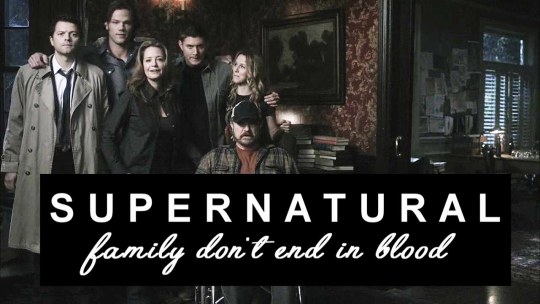
It’s no accident that I got addicted to this show at the time that I did. Namely, my Senior Year of College and 2020. Graduating college and entering the “real world” felt like it’s own sort of apocalypse. 2020 definitely exacerbated my worst tendencies. Messages like “family don’t end in blood”, “you can write your own story”, and “always keep fighting” really resonated with me. I could definitely relate to the feelings of insecurity these character’s felt and the ways they suppressed/repressed their issues instead of facing them. I could relate to the feelings of not fitting in and I could definitely relate to the loneliness. This show helped remind me that I’m not alone. That it’s okay if my values and identity don’t line up with the what I envisioned for myself. And, most importantly, that there is a light at the end of the tunnel and that I should never give up. If Dean, Sam, and Cas can keep moving forward despite their demons and despite how bad it gets, so can I. Regardless of how the story ended, these themes resonated with me and I’ll still hold them with me. A single episode can’t take that away.
4. The Fun Episodes

This show has so many legendary standalone episodes. Changing Channels. Ghostfacers. The French Mistake. Fan Fiction. Tall Tales. Bad Day at Black Rock. When this show goes for the absurd, it goes all-in. It takes the risks it needs to take, it gets completely insane, and it pulls it off. So many of these episodes could have easily been the moment that the show “jumped the shark”. Yet, time after time, the show delivered on it’s potential. I don’t know how much I can say about these episodes except that they made me laugh out loud, made me fall even harder for these characters, and that they’re the episodes I remember best. If I were to rewatch any episode, it would be one of the fun ones. This show knew how to not take itself too seriously and how to poke fun at itself. I’ve always had a soft spot for shows that can make me laugh and cry (X-Files, Buffy the Vampire Slayer/Angel, Doctor Who, etc.), and this show definitely nails the fun part.
5. The Sad Episodes
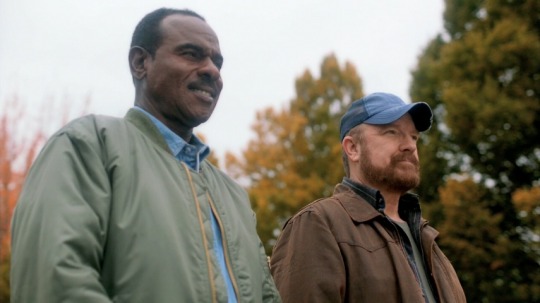
Death’s Door. Hammer of the Gods. Despair. Carry On. Abandon All Hope. In My Time of Dying. Swan Song. When this show wants you to cry, it doesn’t pull the punches. It gets downright devastating. No character is safe. Literally every character you love will either be forgotten or will die. Or both. The amount of trauma Sam and Dean have to go through is insane. Both have literally been to hell and back. Both have killed countless people, including innocents. When this show decides it wants to wreck you, it’s overwhelming. I sobbed when Bobby died. I sobbed when every single member of Team Free Will died for the final time (I still can’t watch any of those scenes). I still wish Jo, Ellen, Charlie, Kevin, Mick, and Gabriel had been given more time to tell their stories. Being a hunter means a life of endless angst. Being an angel or demon doesn’t get you off the hook, either. I remember going into this show thinking it couldn’t hurt me. My favorite character type is “mentor/father figure”. But holy hell...I don’t think every single sad moment was necessarily good writing, but when it was? Damn.
6. The Biblical Themes
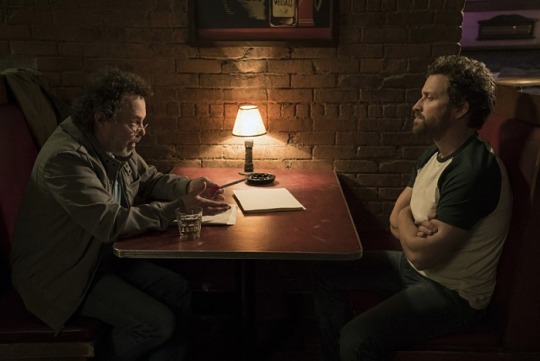
I’m not a relgious person. But, despite this show being steeped in Christian mythology, it really touched on my feelings about the Old Testament in a profound way. Well, really just Ben Edlund and Robbie Thompson did. I’ve never seen a show really hit the overall feel of the bible the way this show does. The idea of Angels as mystical and terrifying creatures. The idea of God as a flawed father figure with a penchant for wrath. The sheer epicness of the biblical stories. The idea of family members constantly being turned on each other. Cain and Abel. Jacob and Essau. Moses and Ramses. Moses and Aaron. Abraham and Isaac. The bible is full of stories of family drama. This show doesn’t always give angels and demons weight. Sometimes it’s silly and stupid and cheesy. But when it hits right? It’s epic. This is more of a personal thing I love about the show, but definitely a plus!
7. The Music
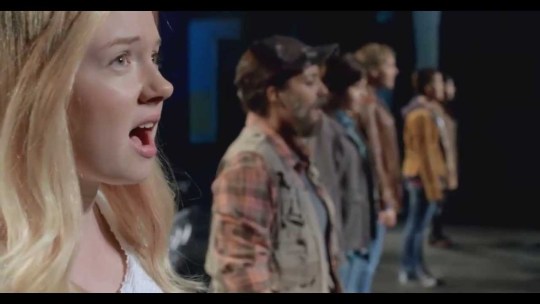
The early seasons music is so good. I really miss the classic rock of the golden era of the show. I mean, there are still some great musical moments later on, but damn. I loved hearing songs I recognized and I loved learning new songs. I loved when the song and the scene hit perfectly in time (Death’s intro. Cas’s return in Season 13.). Also Supernatural wouldn’t be Supernatural without the ‘Carry On My Wayward Son’ song at the end of every season. Even at the end of a season I didn’t love, that recap would always get me pumped. Also Chuck singing Fare Thee Well? Dean and Lee singing together? Fan Fiction? All great.
8. The Cast & Crew

I never care about the actors or actresses in a show. I definitely don’t bother with the names of specific writers and directors or their styles of writing/directing. They’re just random people who happen to write for or play these characters I love. They’re not actually the characters. But these guys? Well, for one, I’m pretty sure half this cast actually is their character. At least to some degree. They’re also just...really cool people? Who are all friends? They make a point to do community service, to interact with fans, and to promote positive ideas. Jared’s Always Keep Fighting campaign. Misha and GISH. The fact that they all participate in fundraising opportunities and encourage fan engagement. Do they all have issues? Definitely. Have they said stupid things? Yes. But the good far outweighs the bad. They’re an entertaining bunch whether onscreen or not and I hope they all do well in whatever their future endeavors may be.
9. The Fandom

I joined this fandom late. To be honest, I thought this fandom was obnoxious before I found myself a part of it. Now that I’ve been in the trenches? It’s got it’s ups and downs like any fandom. There are some parts that are more toxic than others. A lot of people yelling that their opinion is the only opinion. But overall? The good outweighs the bad. And the good? The good is great. Some fanfictions I’ve read are better than actual books I’ve read and just as moving. The fanart? Incredible. I love reading all the metas about random aspects of the show I never would have noticed. I love the music videos and I love the analytical videos. In real life, I’ve made many friends through our mutual love of this show. Hell, even getting sucked into GISH once or twice has given me some solid memories and brought me closer to friends. I wish all fandoms were this much like family. I’m so glad I got to be a part of this fandom and I can’t wait to continue being a fan. After all, nothing ever stays dead in Supernatural.
10. The Chaos & Insanity

Season 16 has been a time. First, Destiel went canon. Then suddenly Sherlock was having a 5th season, Putin was retiring, and Georgia was going blue. Destiel going “canon” and Joe Biden winning the presidency will always be correlated in my mind now. Things in the fandom went from quiet to blaringly loud real fast. Carry On happened. The fandom went into a civil war. I can’t even remember half of what happened in Season 16, but it’s been a wild ride. There’s been ups (my personal favorite being the french dub and the Saileen wedding). There’s been downs (Jared’s controversial statements and the original scripts being leaked). At one point Misha Collins had sex with Bill Clinton???? It’s been a wild time. It’s honestly gotten me through the end of this pandemic. At least it’s entertaining. I would say that at least all the craziness is over, but is it ever really over? Every time I say that something else completely insane happens. But it’s been fun. I’m glad I started watching this show despite my reservations and here’s to whatever happens next.
#team free will#team free will 2.0#castiel#jack kline#sam winchester#dean winchester#sam and dean#destiel#wayward sisters#supernatural#spn#misha collins#jared padalecki#jensen ackles
17 notes
·
View notes
Photo
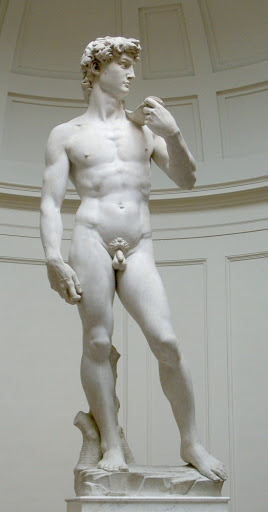
A photo of David by Michelangelo (Italian Renaissace Org, 2012)
Looking At Sculpture: The Beauty of Michelangelo's David sculpture
Michelangelo's statue of David, considered one of the greatest sculptures ever made, encapsulates the aesthetics of High Renaissance architecture, the politics of Renaissance Florence, and the technological virtuosity of Greek sculpture. The marble sculpture, which depicted David about to fight Goliath - an appropriate analogy for a Florentine city-state beset by powerful rivals - was placed outside the Palazzo Vecchio, Florence's civic government center, where it remained until 1873.
David by Michaelangelo is a 17 ft marble statue that conveys the biblical character, David. It was made during the Renaissance era between 1501-1504. According to Matisse (2011), it was originally commissioned by Agostino di Duccio and Antonio Rossellino back in 1464 and 1475 respectively. However, both sculptors had to reject it because of the large amount of marble to be used and the design had too many imperfections regarding the sizing of the body. So, the Cathedral of Florence had to approach Michelangelo from him to finish the statue, David, for the series of large statues for the cathedral’s tribunes. This statue illustrates a nude standing male looking on its left side. It seems that the statue is observing an important event that happened looking as if he is satisfied with the event that happened.
Michelangelo's statue had a well-worn motif. The Biblical tale of how the young David, equipped only with a sling and pebbles, defeated the Philistine giant Goliath in single combat was a common theme in Renaissance art. Andrea del Verrochio (1436-88) created his famous bronze of David (Bargello Museum) in 1443, and Donatello (1386-1466) created his famous bronze of David (Bargello Museum) in 1475. Both works, on the other hand, show David after the battle, holding the head of his slain opponent. Michelangelo, on the other hand, portrays him before the battle with Goliath.
Instead of being calm and optimistic after his triumph, Michelangelo's David appears nervous and ready for battle. His forehead is furrowed; his neck tendons, as well as the muscles in his nose and lips, are stiff; and his eyes are fixed on something off in the distance. He stands in a comfortable contrapposto stance, his sling casually thrown over his left shoulder, notwithstanding his mindfulness. This vigorous posture and relaxed expression are meant to capture the brief time between making the decision to fight and actually fighting.
Upon that substrate, Michelangelo's David appears to be a High Renaissance depiction of the standing heroic male nude, which was a common motif in High Classical Greek art (450-400 BCE). However, in fact, the configuration is more complicated and political. To begin with, Michelangelo emphasizes the emotional rather than physical aspect of David's triumph by omitting the standard bloody sword and gruesome severed head. This, like the statue's placement near the Florentine government's heart, is almost definitely a political comment. Michelangelo is attempting to demonstrate that David's integrity is the key to his victory. David, like the city of Florence, is a force to be reckoned with.
We know Michelangelo’s David to be a sculpture created during the Renaissance period. Interestingly, David’s pose and facial expression is highly reminiscent of early sculptures of the Classical period when sculptors had just started to develop a taste for anatomical accuracy (University of Oxford Classical Art Research Centre, 2013). Since such improvements in executing accurate anatomy could not happen overnight, therefore it was a common sight for Classical sculptures to have their subjects shifting their weight to one leg known as contrapposto or “counterpose” (Richman-Abdou, 2020). During Michelangelo’s time, artists continually strived for the ideal of perfect humanity, hence the great amount of detail and mathematical applications put into this sculpture, balanced out by organic elements (Gilbert, 2021). The statue has an ambiguity to it that contrasts with its massive size.
The figure's pose is rather straightforward. Because of the block's proportions, a shifting stance or aggressive movements would have thrown the balance off. Michelangelo may not have had enough volume to work with because of the state of the work at the time he received the monolith. It was clearly a feat of engineering to remove an entity as noble and lively as his David from this mass in the shape of an incredibly long rectangle. David is standing with his right leg completely extended and his other leg laid back. This traditional pose, known as contrapposto, aligns his hips and shoulders at right angles, giving his torso a subtle s-curve. The young hero - or, maybe, the young god - leans his left leg slightly forward and lets his right arm hang loose halfway down his thigh, while his left arm is bent to shoulder height. He awaits his adversary Goliath with a bold look yet a thoughtful face, firm footed, calmly measuring, like a real Florentine, the chances of war when preparing for battle. Realistically, the statue's dimensions are unusual for Michelangelo's work: the figure, for example, has an exaggerated head and hands.
However, these disproportionate dimensions may have been purposefully chosen in order for it to be visible from its intended location on the roof of Florence Cathedral. The vast scale of the statue, which awed the audience, including Michelangelo's contemporaries, was the most impressive feature. Since late Roman times, it was the first monumental free-standing statue carved.
We know David to be one of the most well-known Biblical characters and as a symbol for courage. His story can be found in the Old Testament of the Holy Bible, in the first book of Samuel. 1 Samuel 17:37 (NIV) reads, “The Lord who rescued me from the paw of the lion and the paw of the bear will rescue me from the hand of this Philistine.”; in this line, David was speaking in relation to Goliath (the giant). One of the representations of David is the biblical character of David in David and Goliath. According to Academia.org (2019), David signifies how strong the youth can be when in battle. This also shows the exact moment when Goliath called out David that he could defeat him. According to Matisse (2011), some artists interpreted the exaggeration of hands because of the meaning of David which is “strong of hand”. There is no exact meaning into why Michelangelo made the hands huge. David represents liberty that is ready to battle out those who are against the freedom of the country. Michelangelo's great work may thus stand for the strength and glory of humanism, but it is a strictly Christian humanism within the Catholic sense. Indeed, Christian humanism blossomed during the Renaissance. The Renaissance thinkers were unafraid to extol the promise of Adam's race inspired by grace, rooted in the optimism that man was made in God's picture.
Sources:
Accademia.org. (2019). Michelangelo’s David: Admire World’s Greatest Sculpture at Accademia Gallery. [online] Available at: https://www.accademia.org/explore-museum/artworks/michelangelos-david/ [Accessed 3 May 2021].
Britannica. (2017). David | Description, History, & Facts | Britannica. Encyclopædia Britannica. [online] Available at: https://www.britannica.com/topic/David-sculpture [Accessed 12 May 2021]
Gilbert, C. (2021). Michelangelo | Biography, Sculptures, David, Pieta, Paintings, Facts, & Accomplishments | Britannica. Encyclopædia Britannica. [online] Available at: https://www.britannica.com/biography/Michelangelo#ref361947 [Accessed 12 May 2021].
Henri Matisse. (2011). 10 Facts That You Don’t Know About Michelangelo’s “David.” [online] Available at: https://www.michelangelo.org/david.jsp [Accessed 3 May 2021].Italianrenaissance.org. (2012). Michelangelo’s David – ItalianRenaissance.org. [online] Available at: http://www.italianrenaissance.org/michelangelos-david/ [Accessed 10 May 2021].
Richman-Abdou, K. (2020). Why Michelangelo’s “David” Is an Icon of the Italian Renaissance. [online] My Modern Met. Available at: https://mymodernmet.com/michelangelo-david-facts/ [Accessed 12 May 2021].
University of Oxford Classical Art Research Centre. (2013). The Classical period - Styles and periods - Sculpture - The Classical Art Research Centre and The Beazley Archive. [online] Available at: Ox.ac.uk. https://www.beazley.ox.ac.uk/sculpture/styles/classical.htm [Accessed 12 May 2021]
3 notes
·
View notes